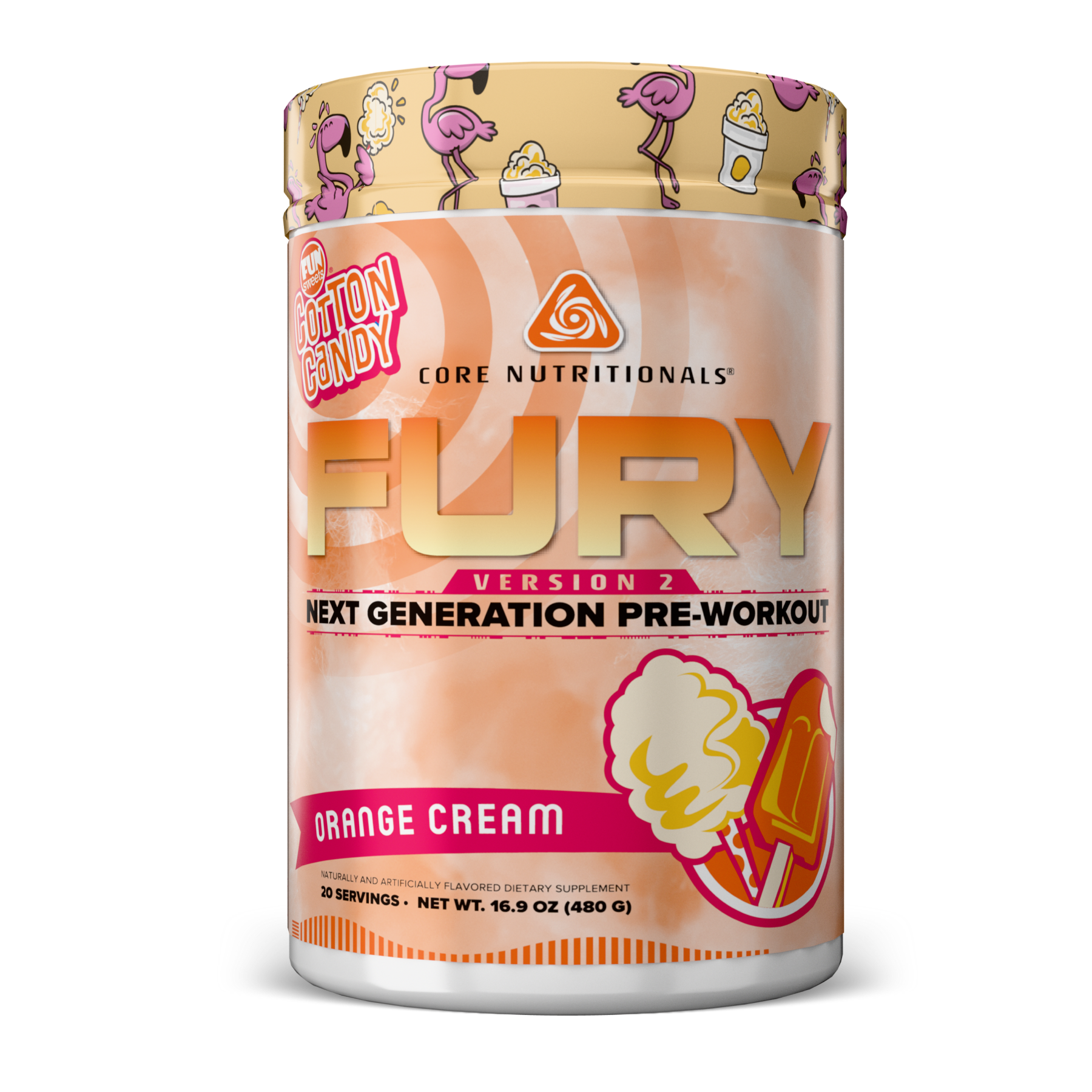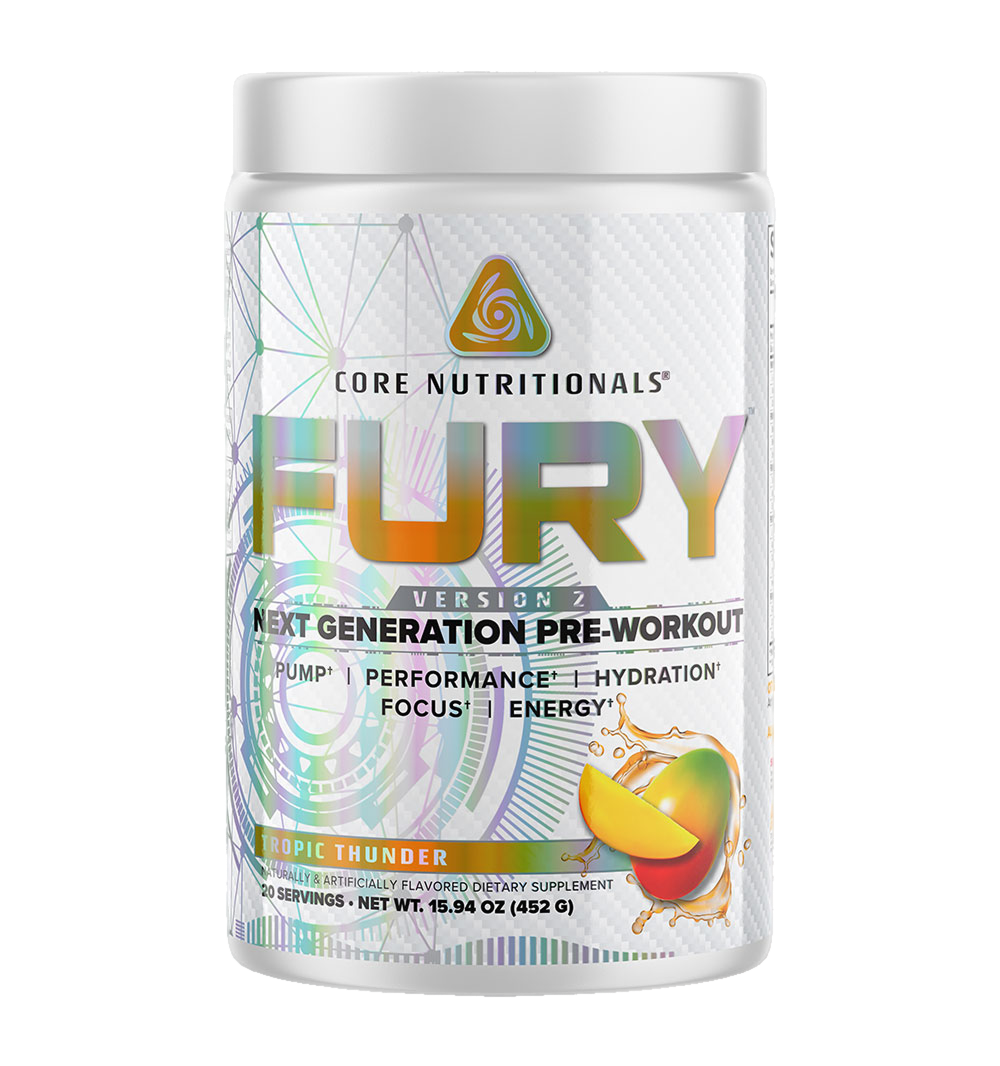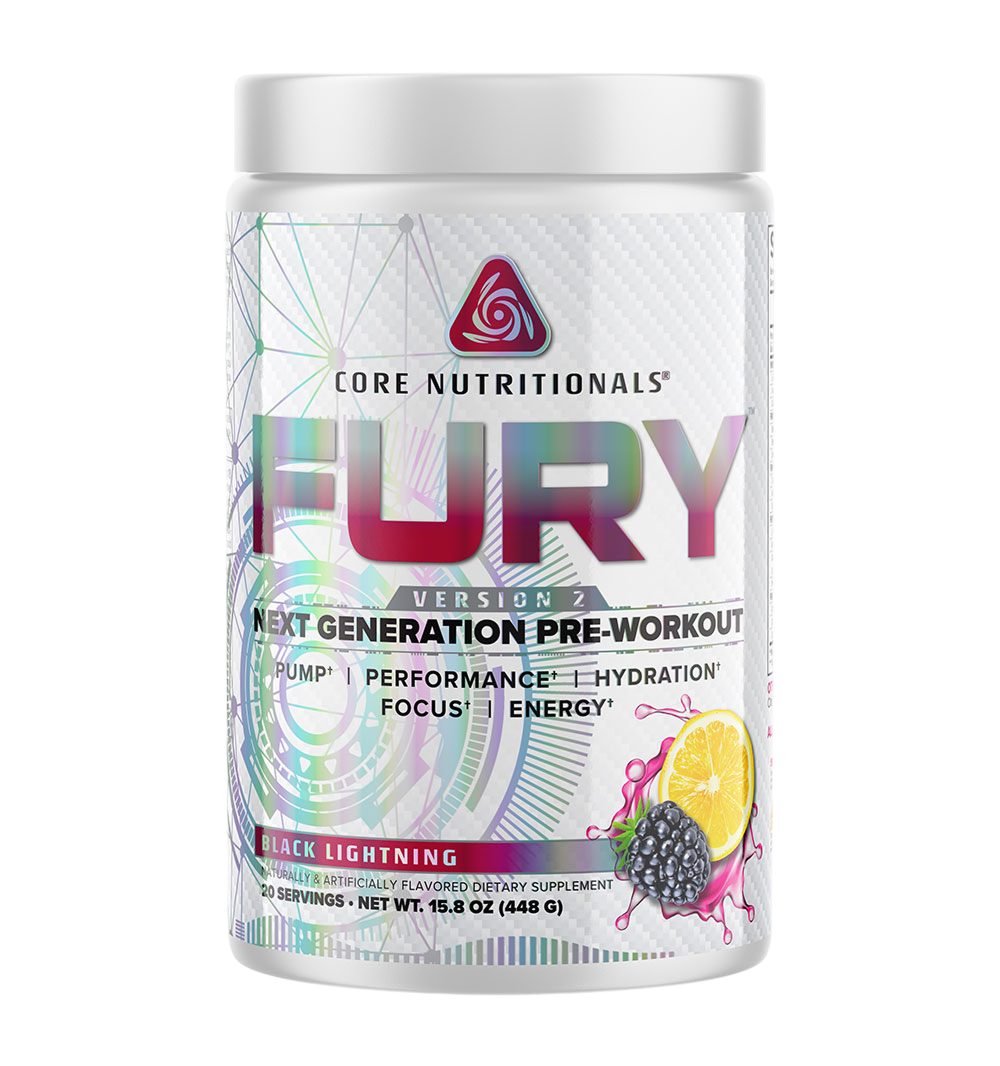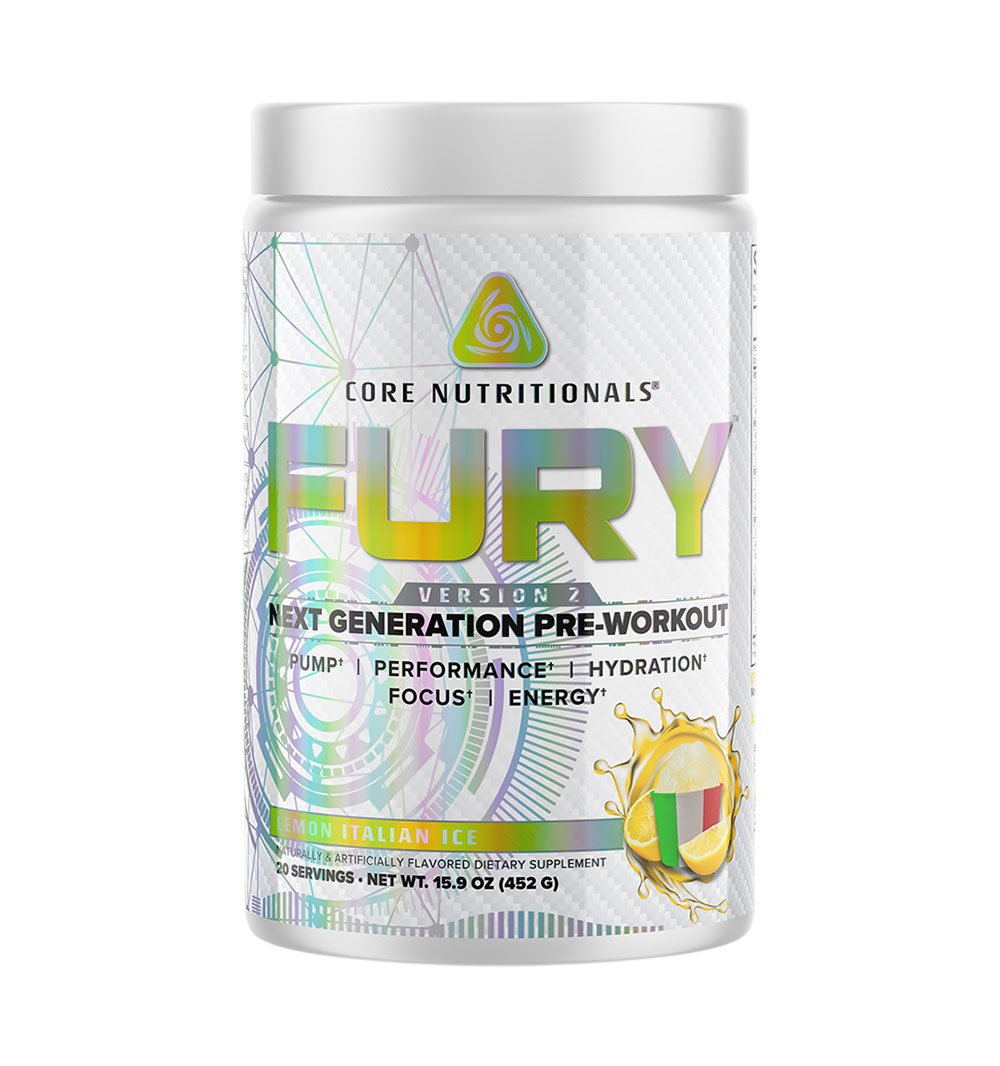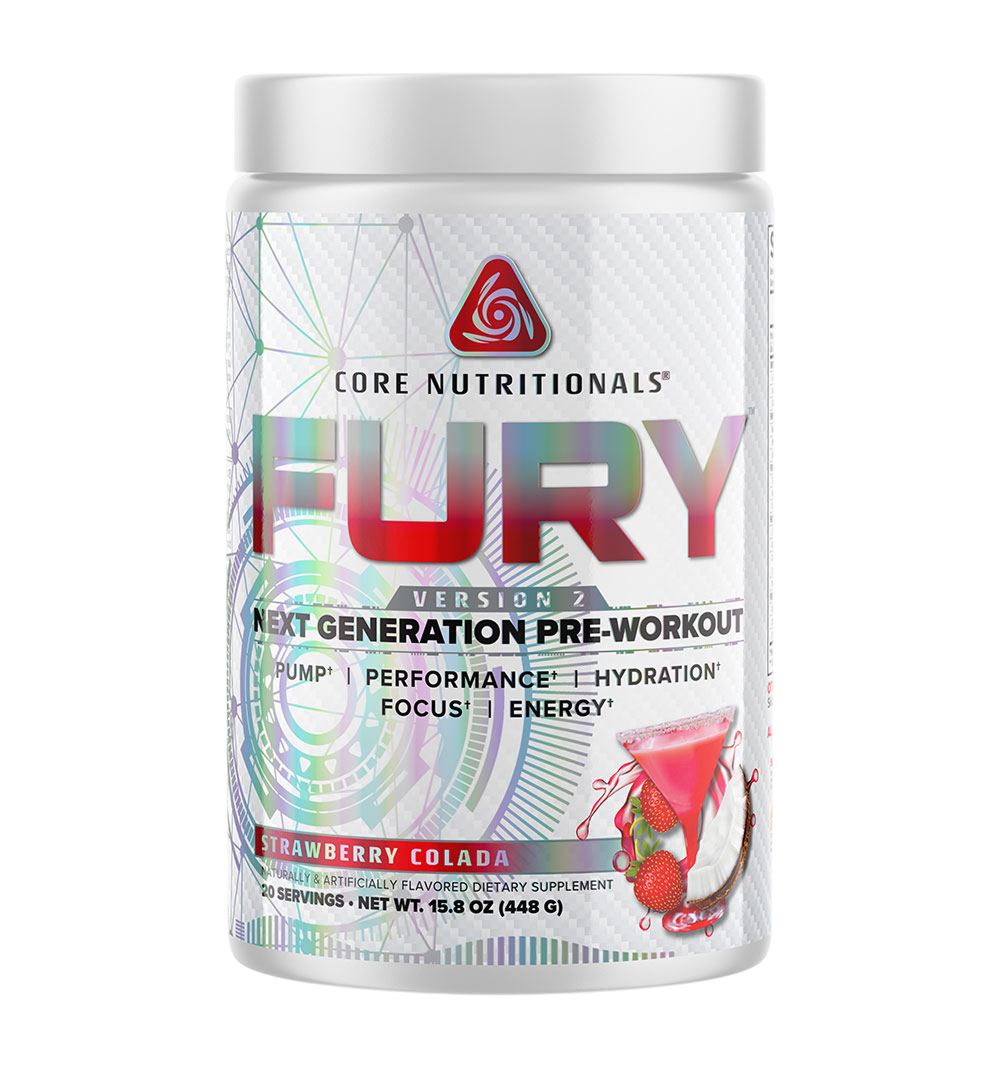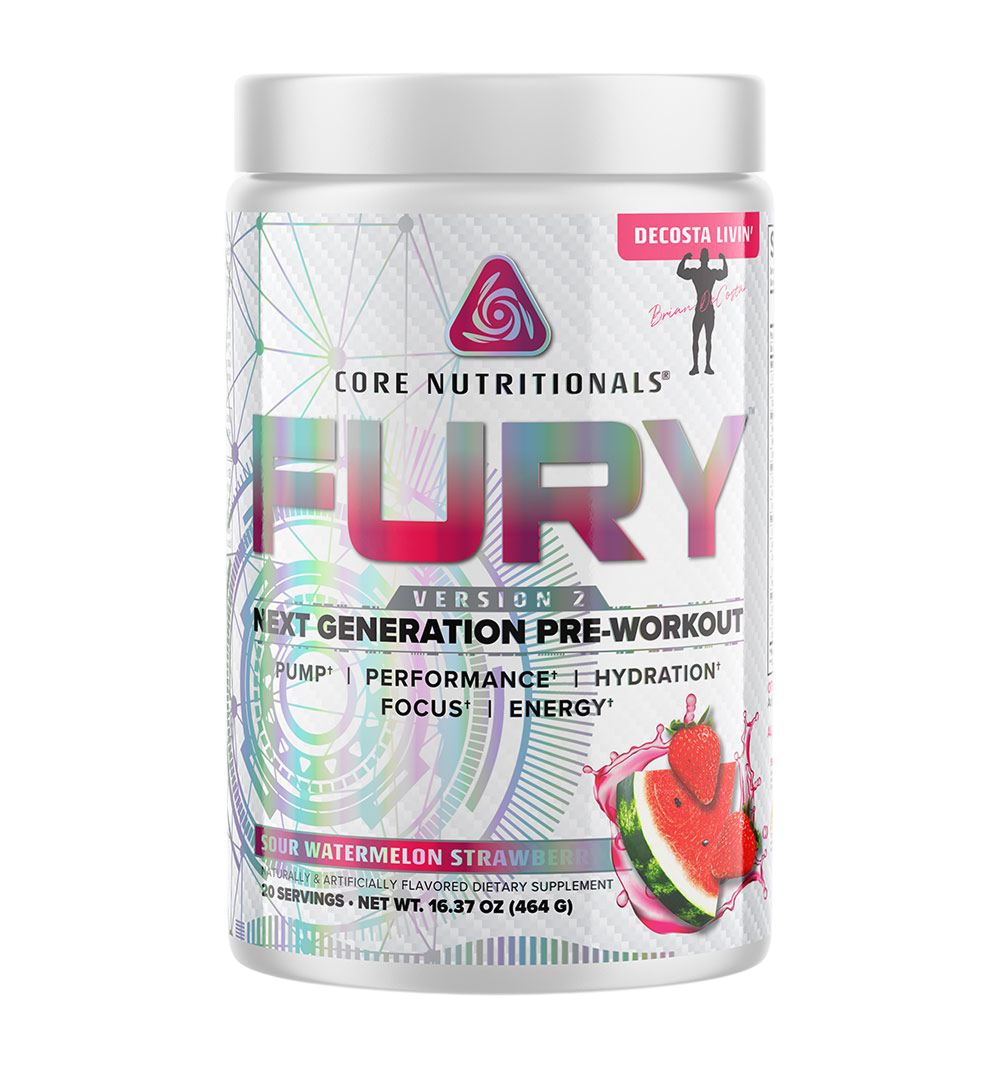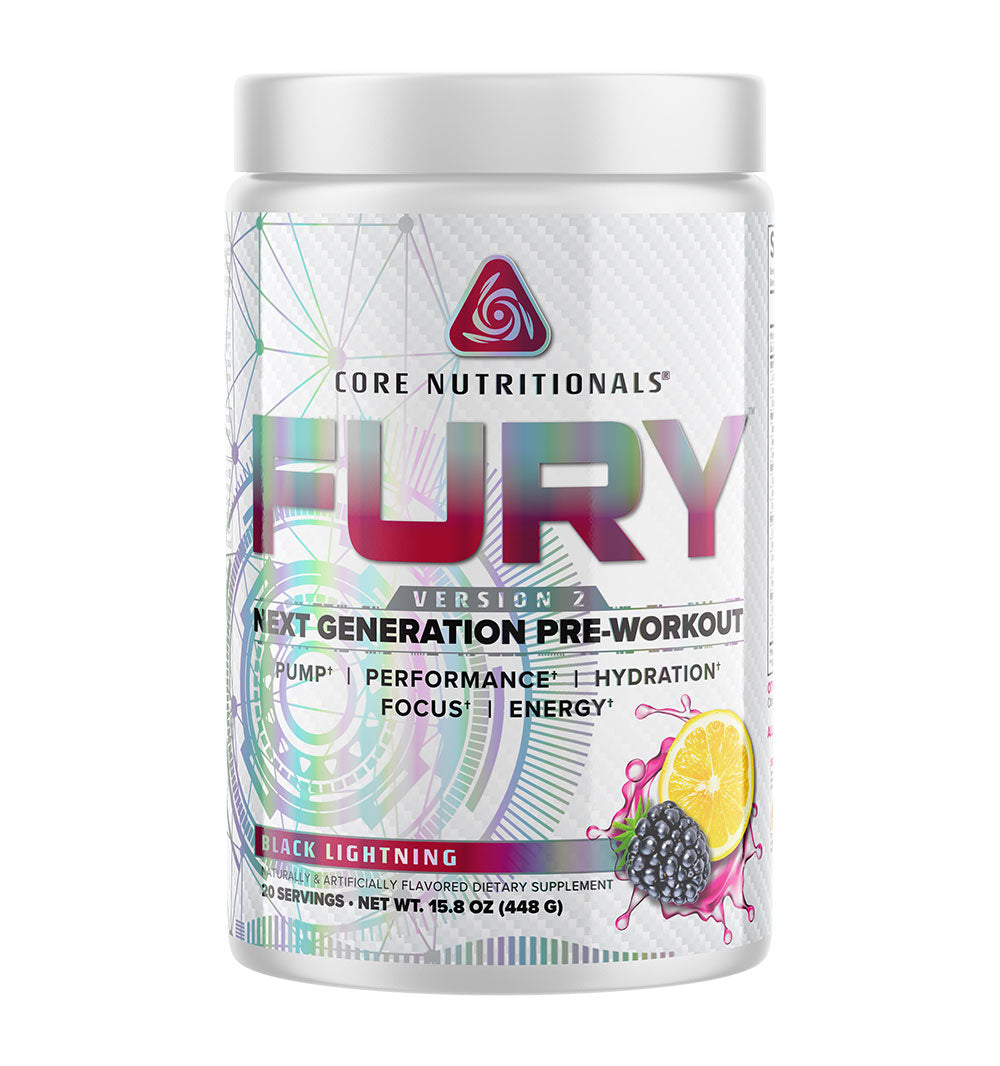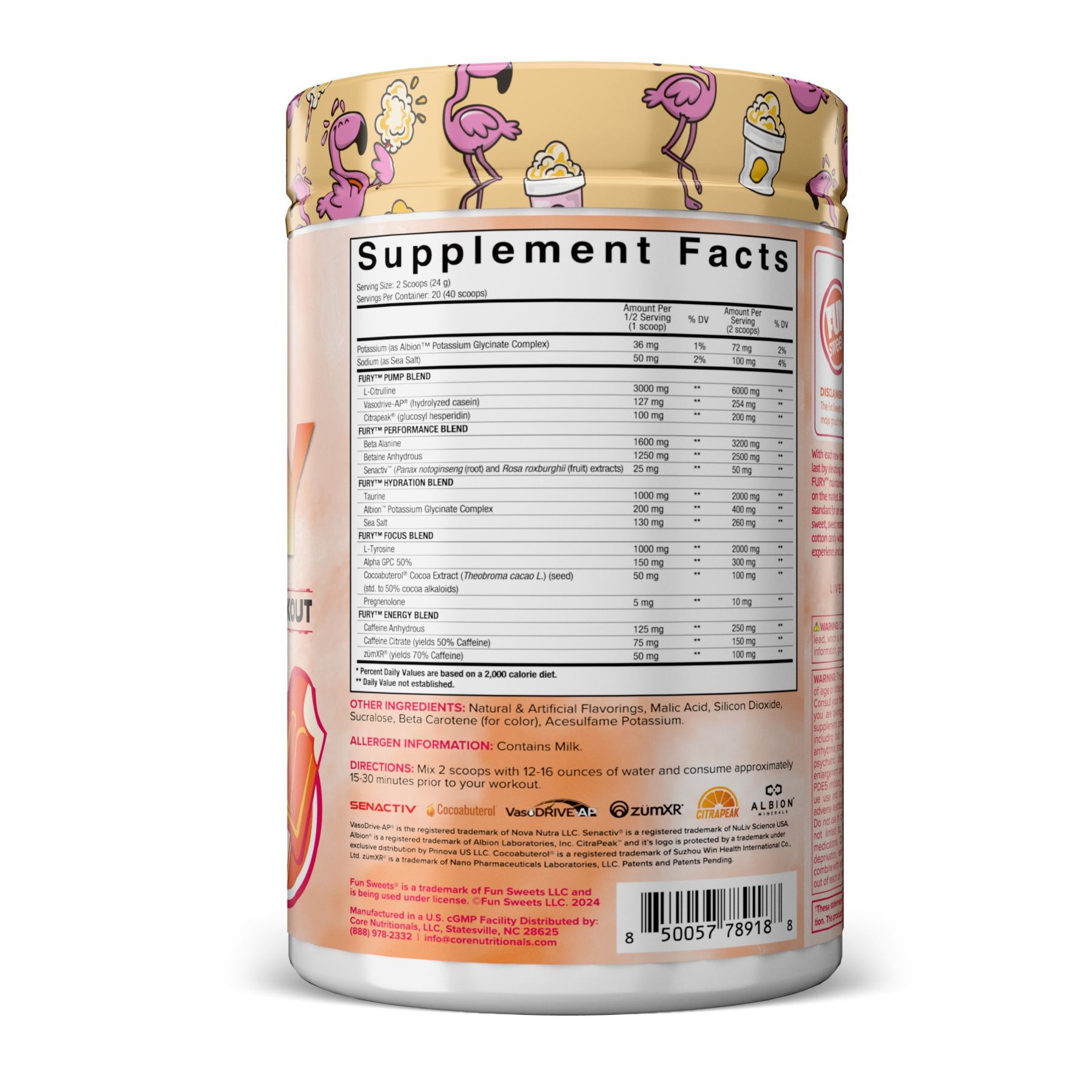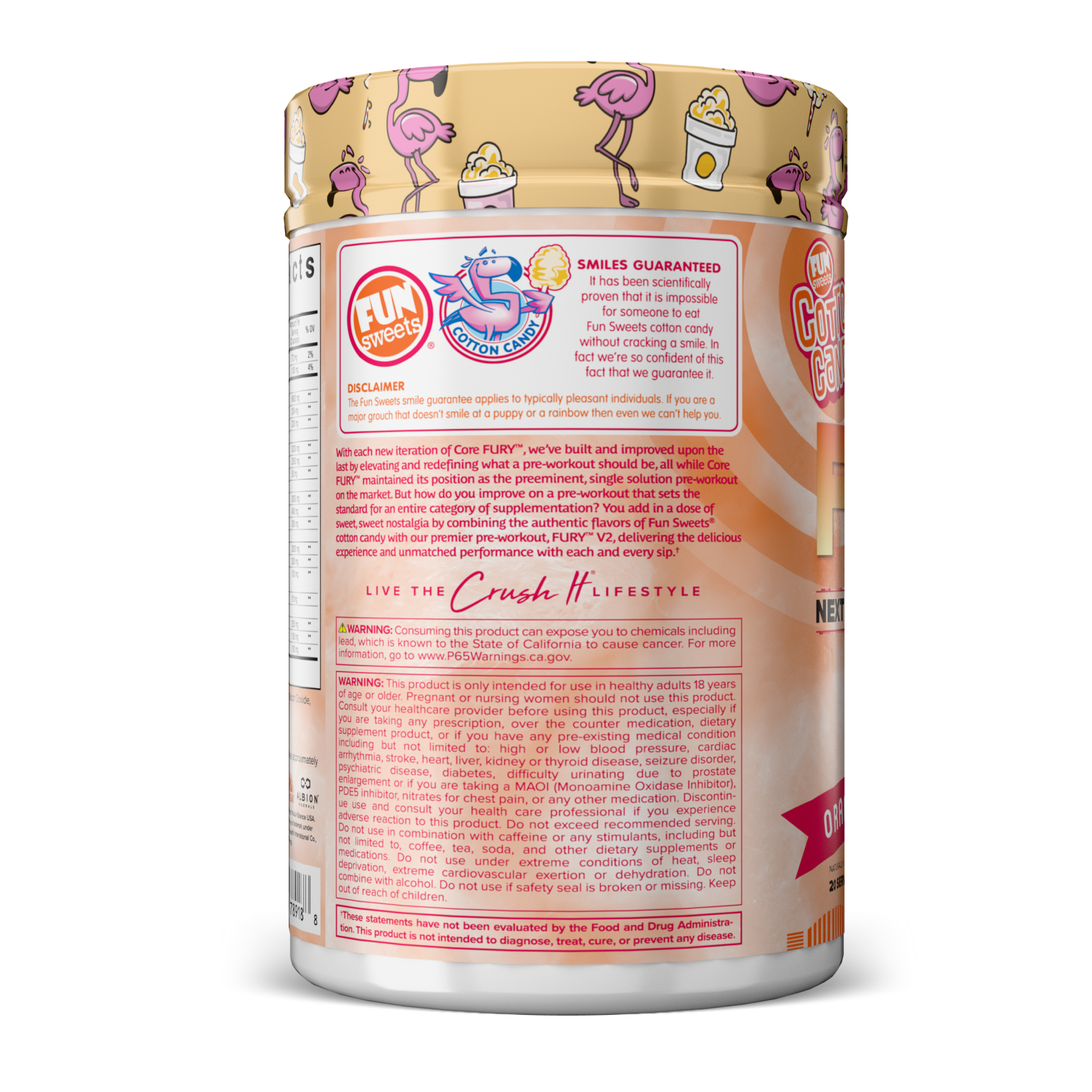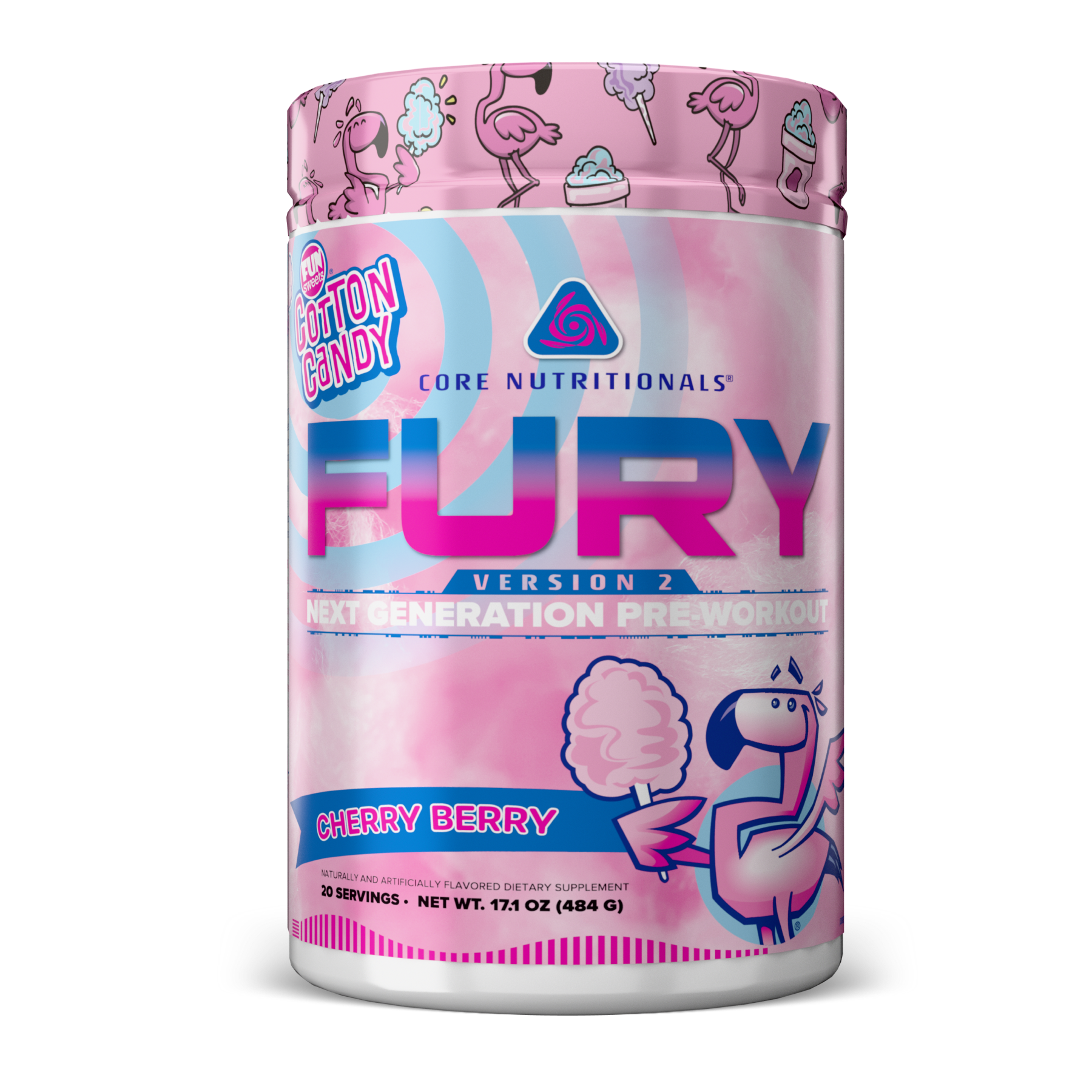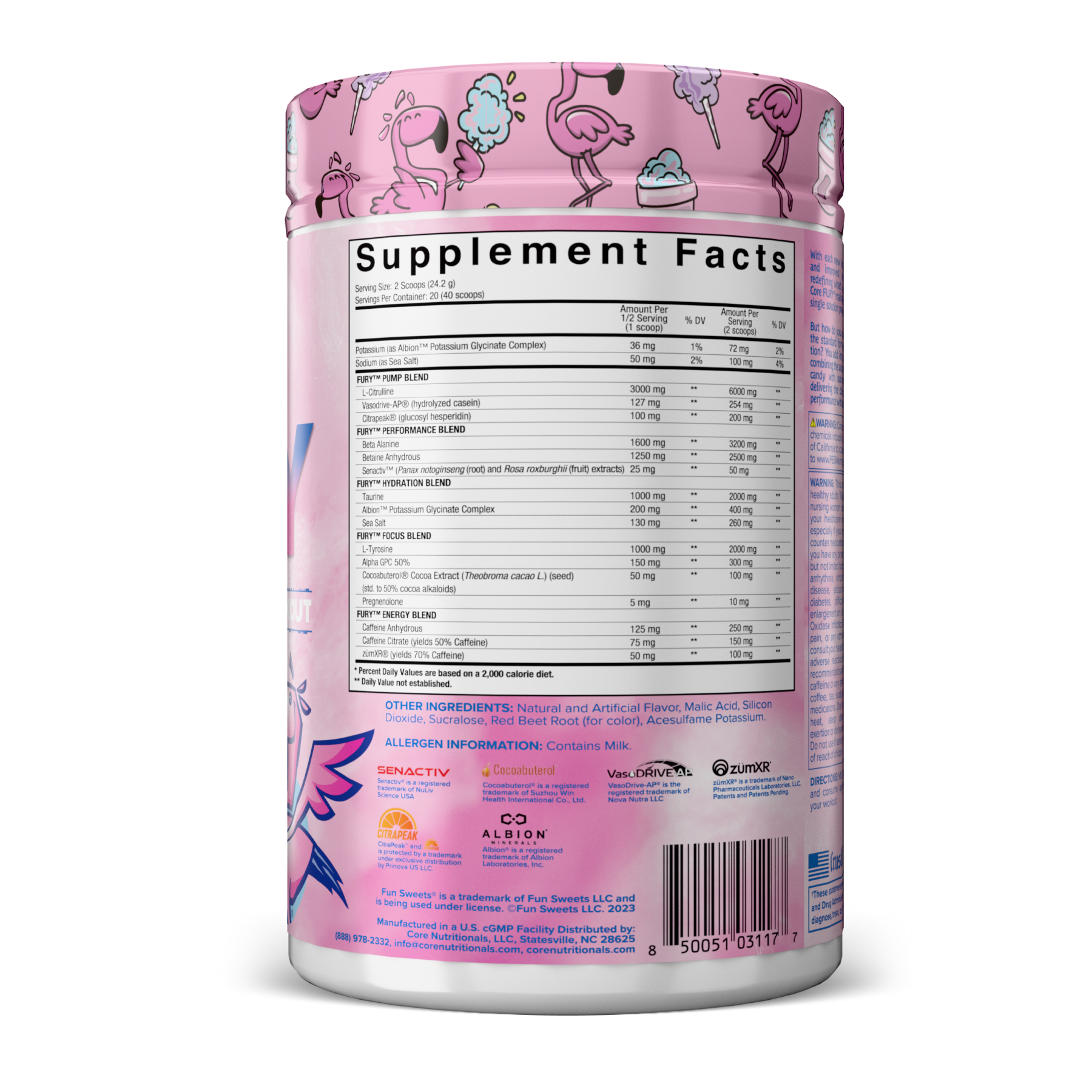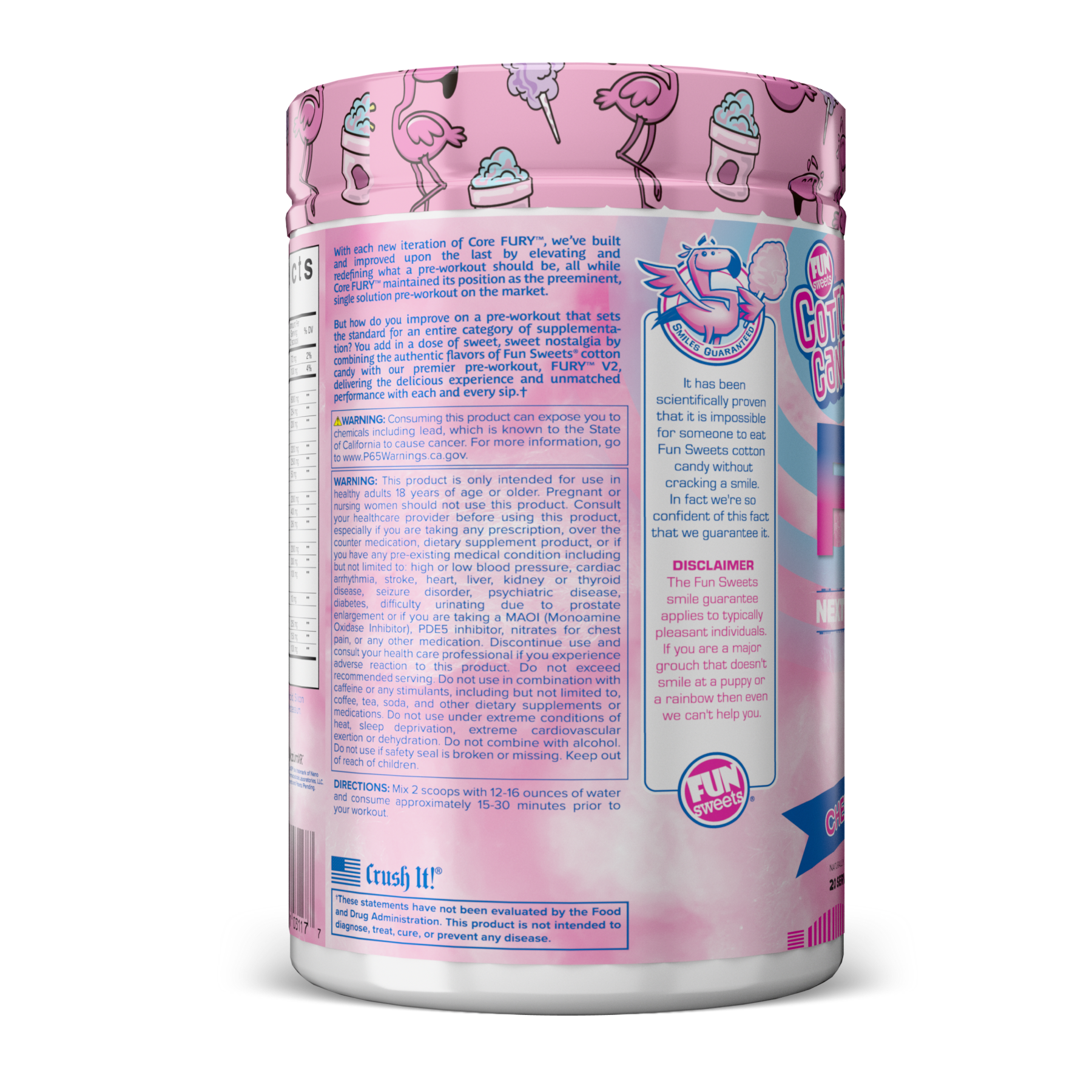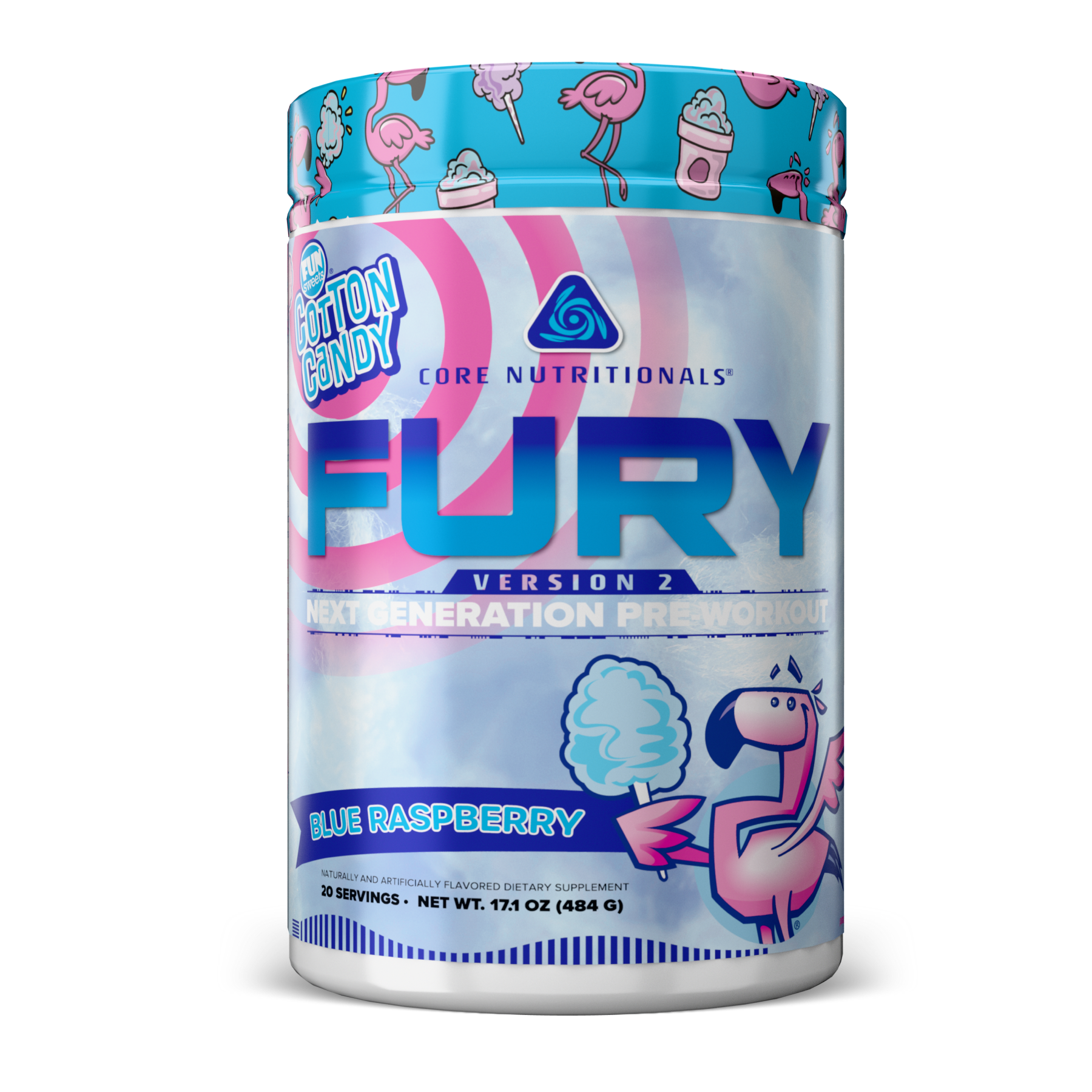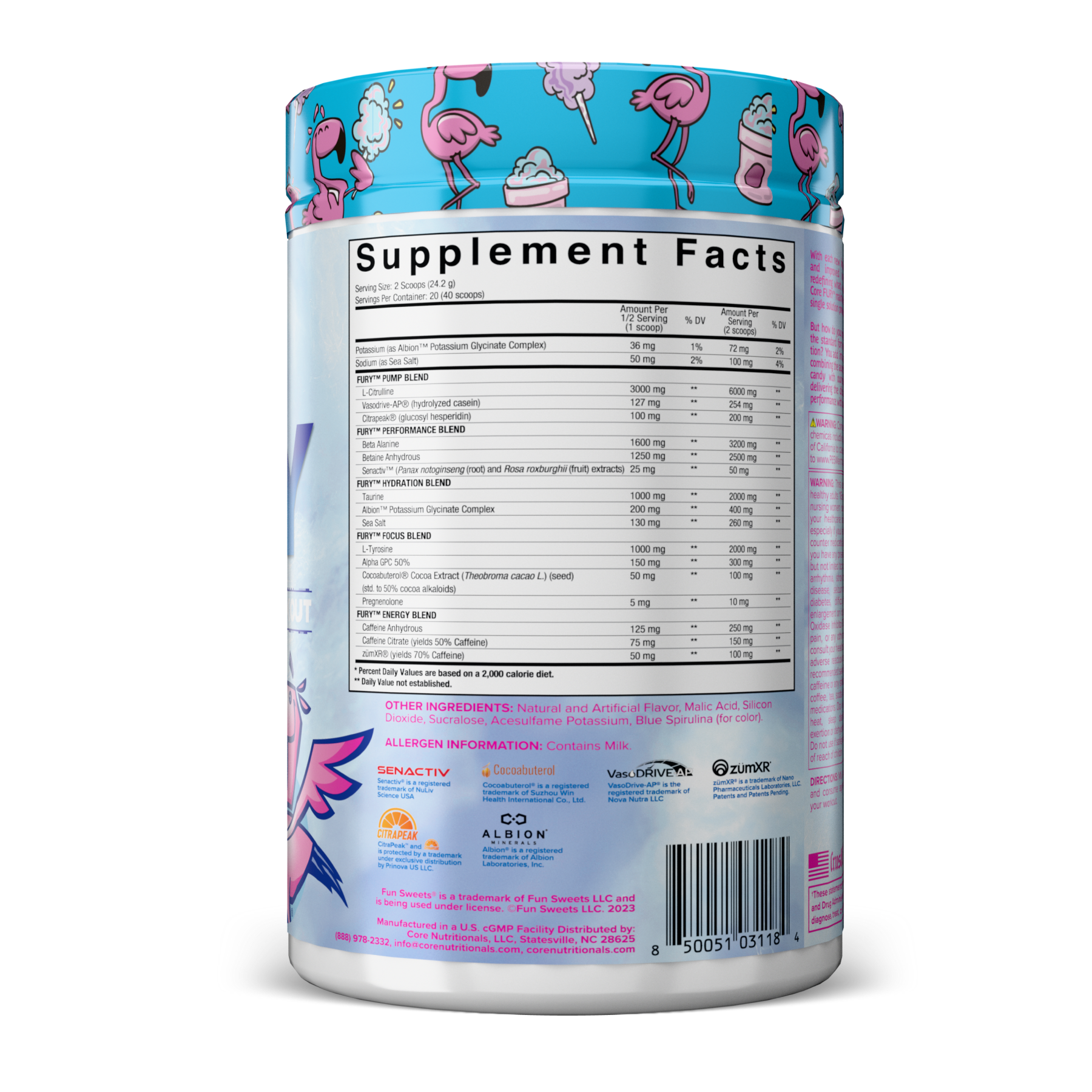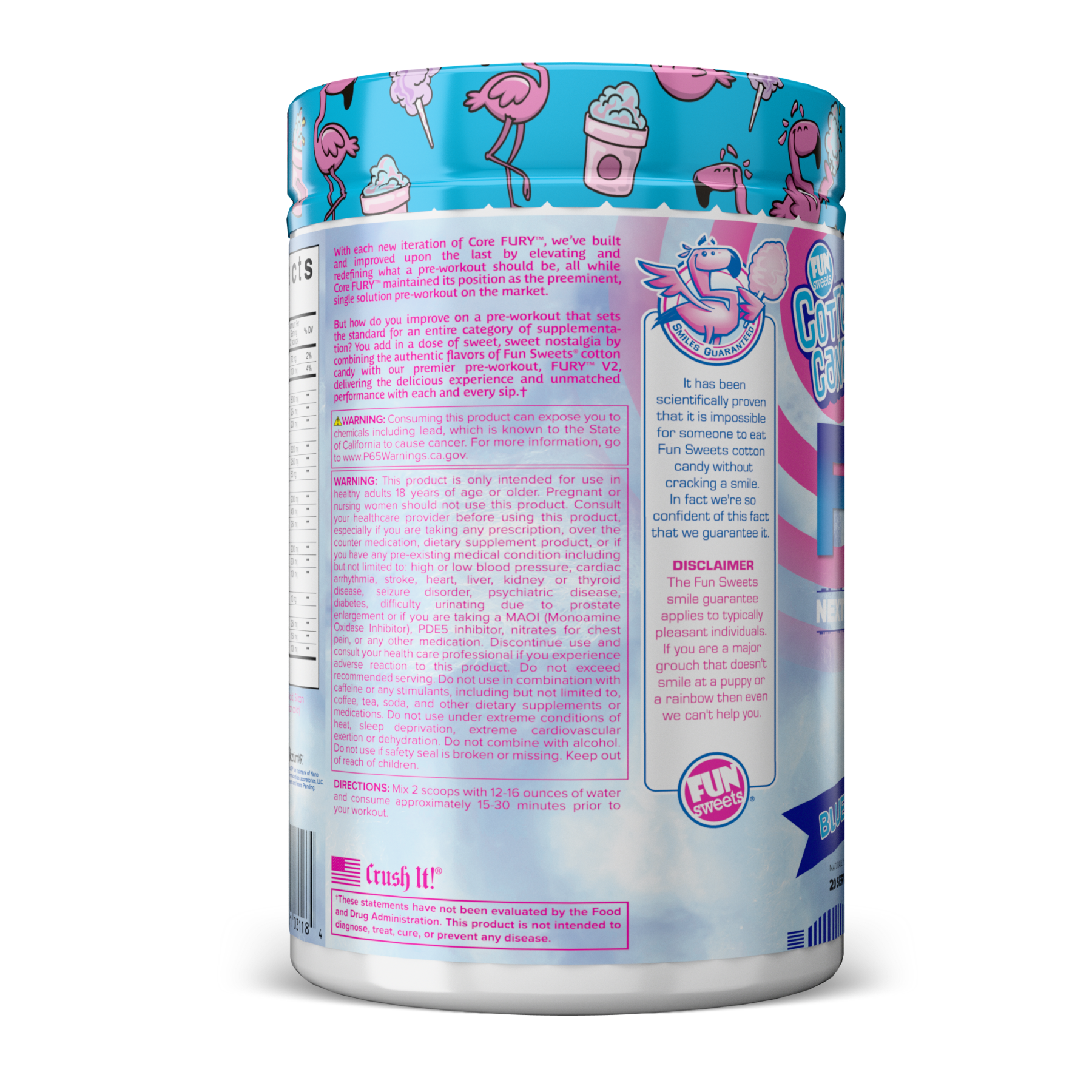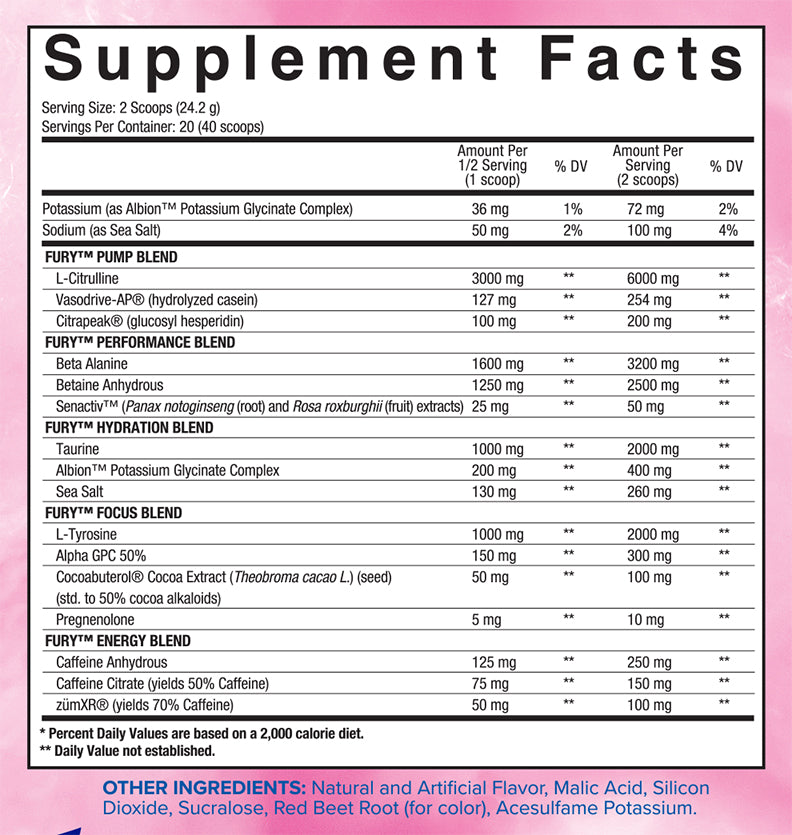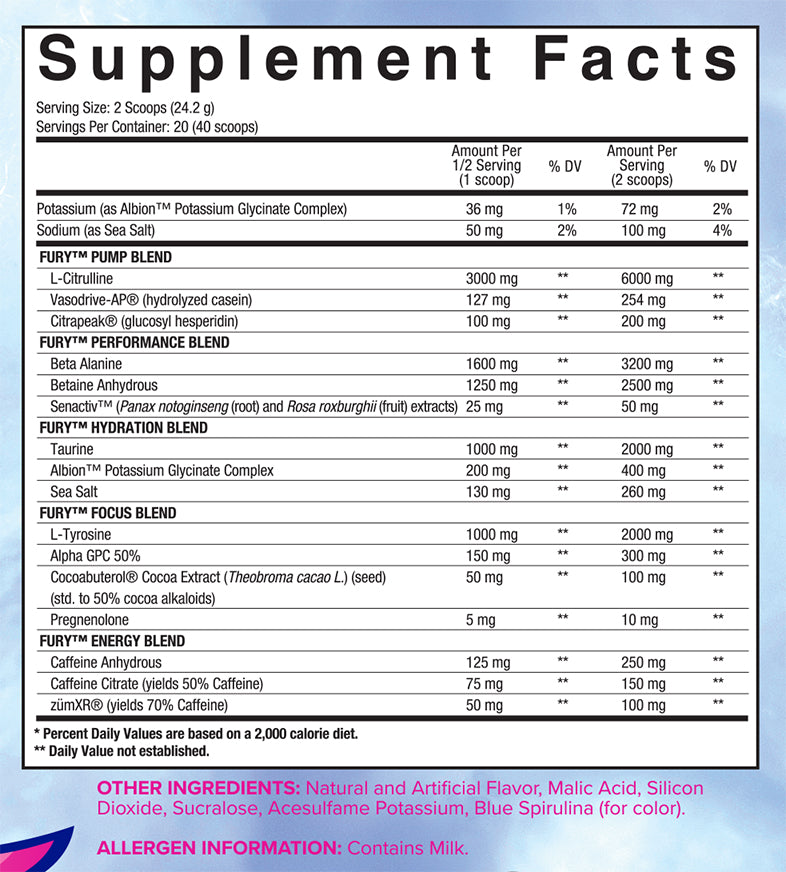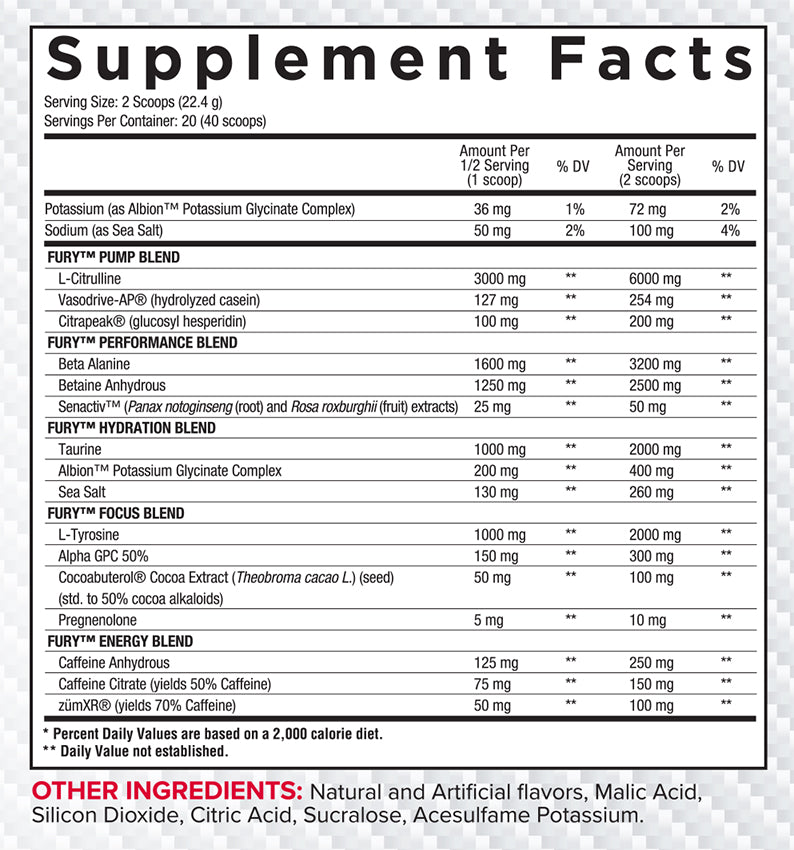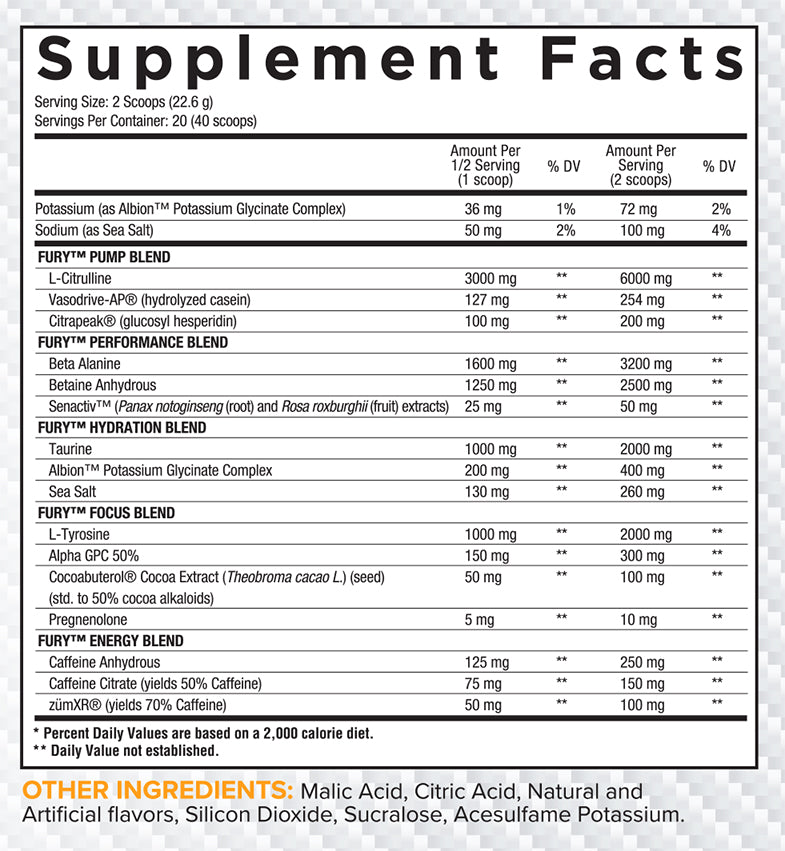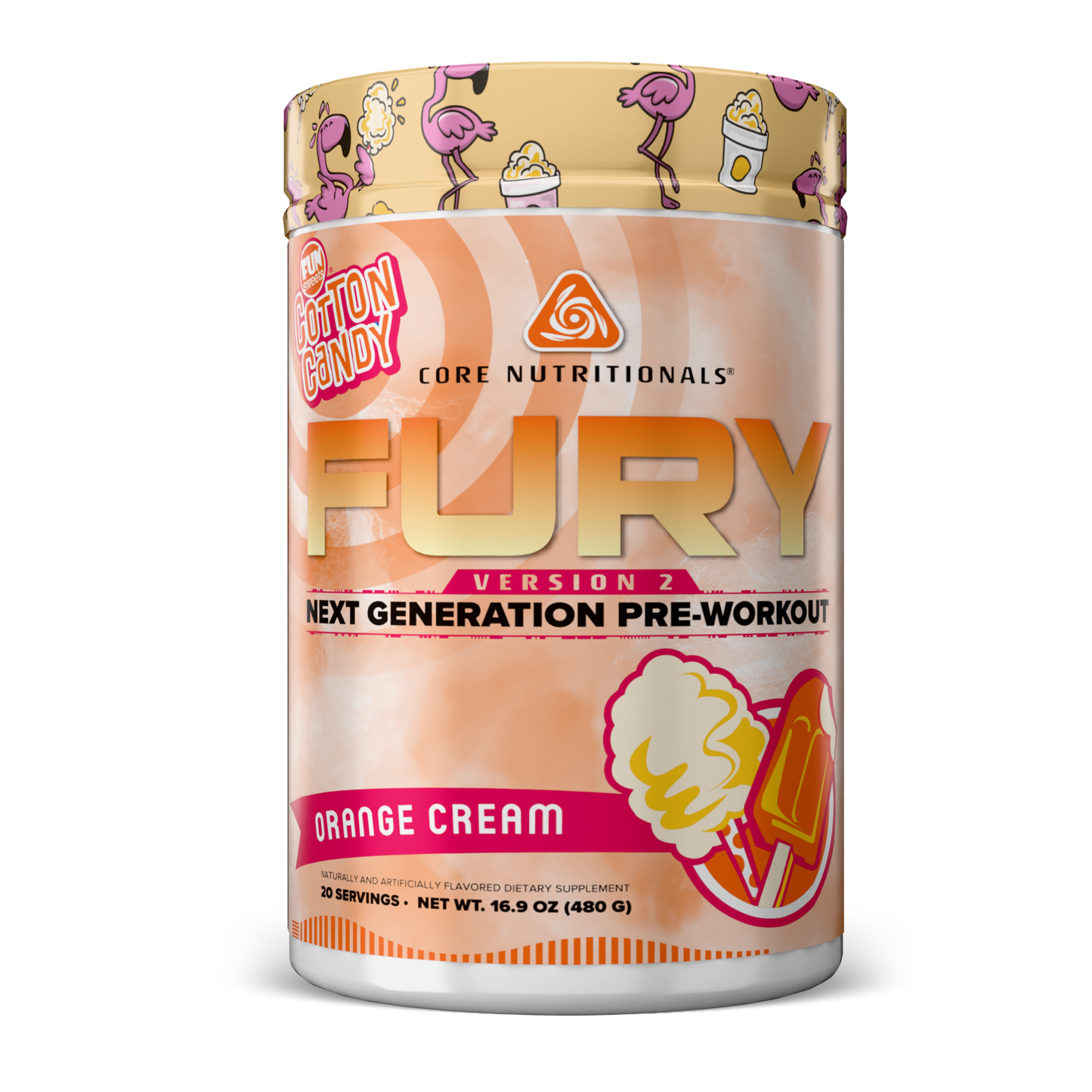
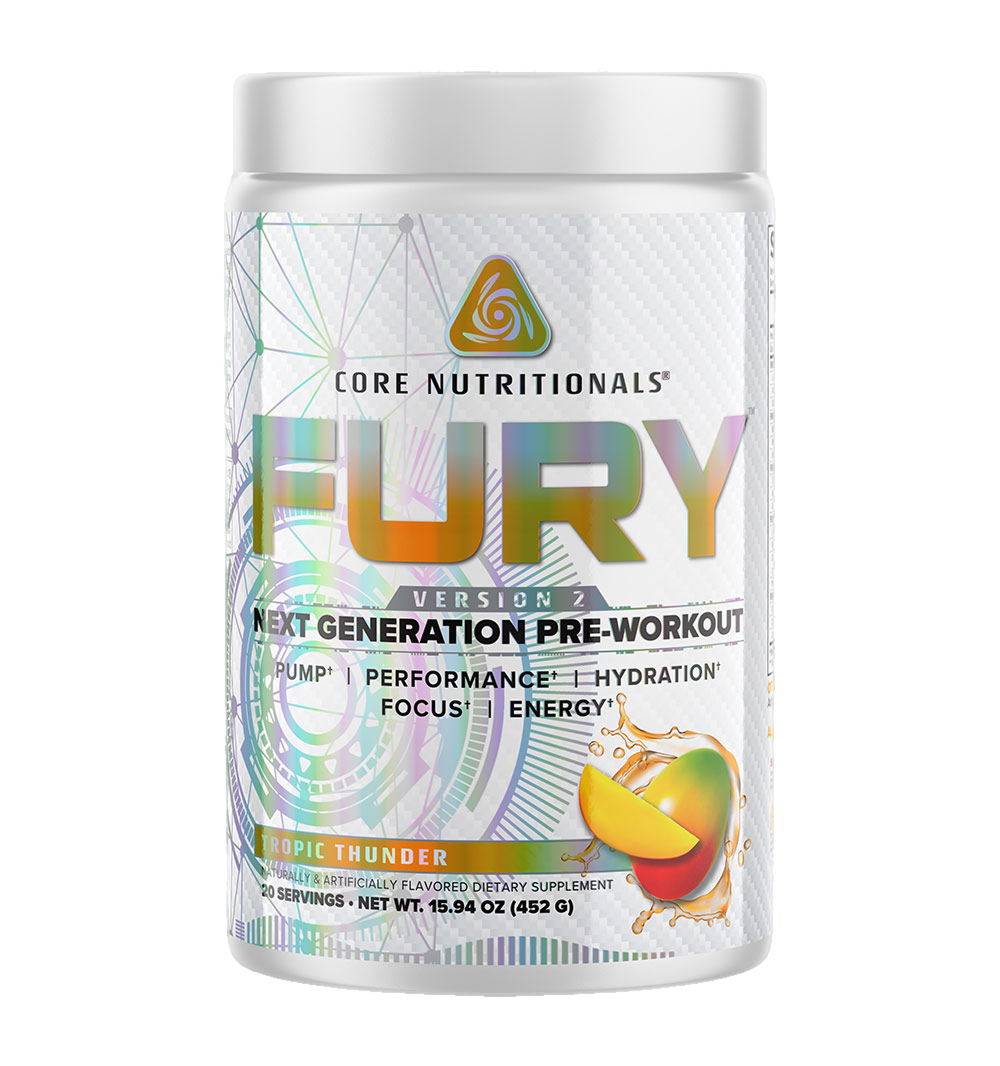
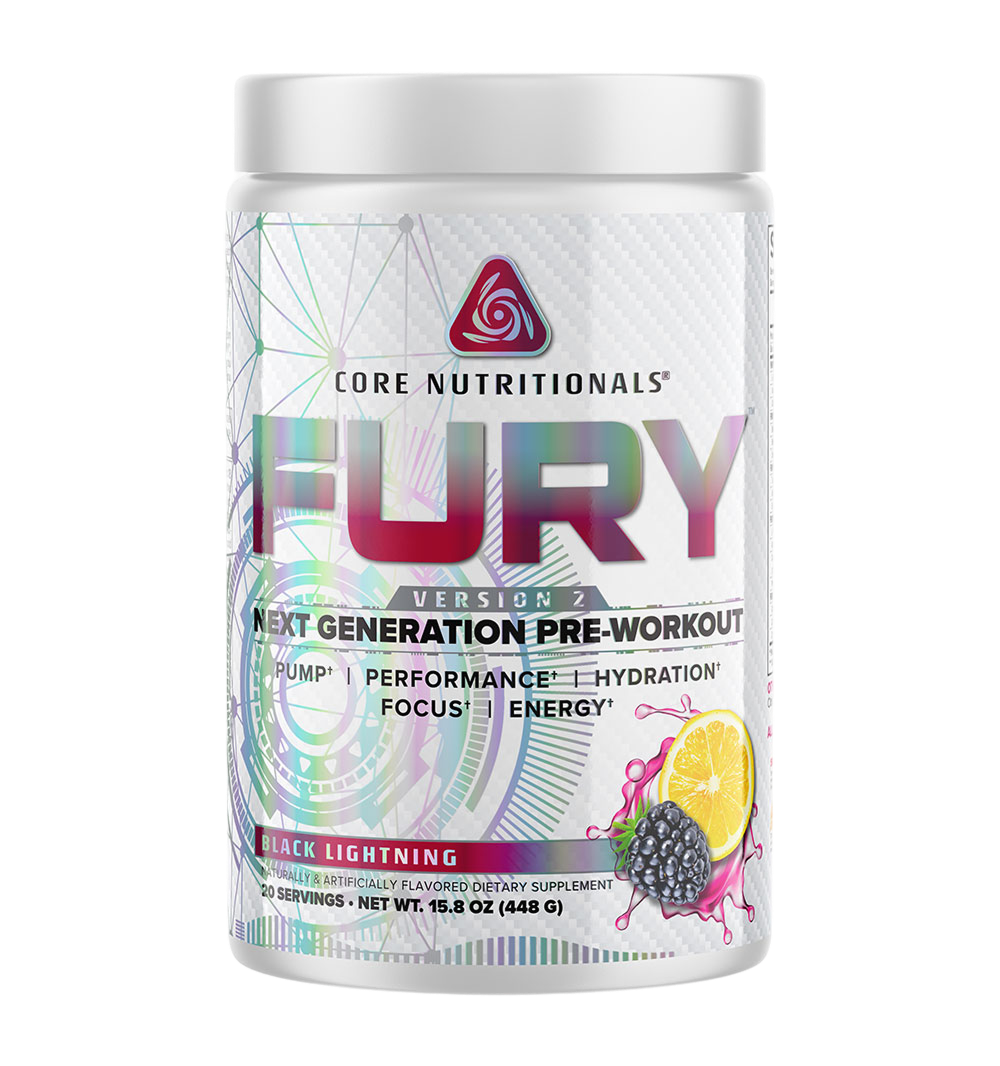
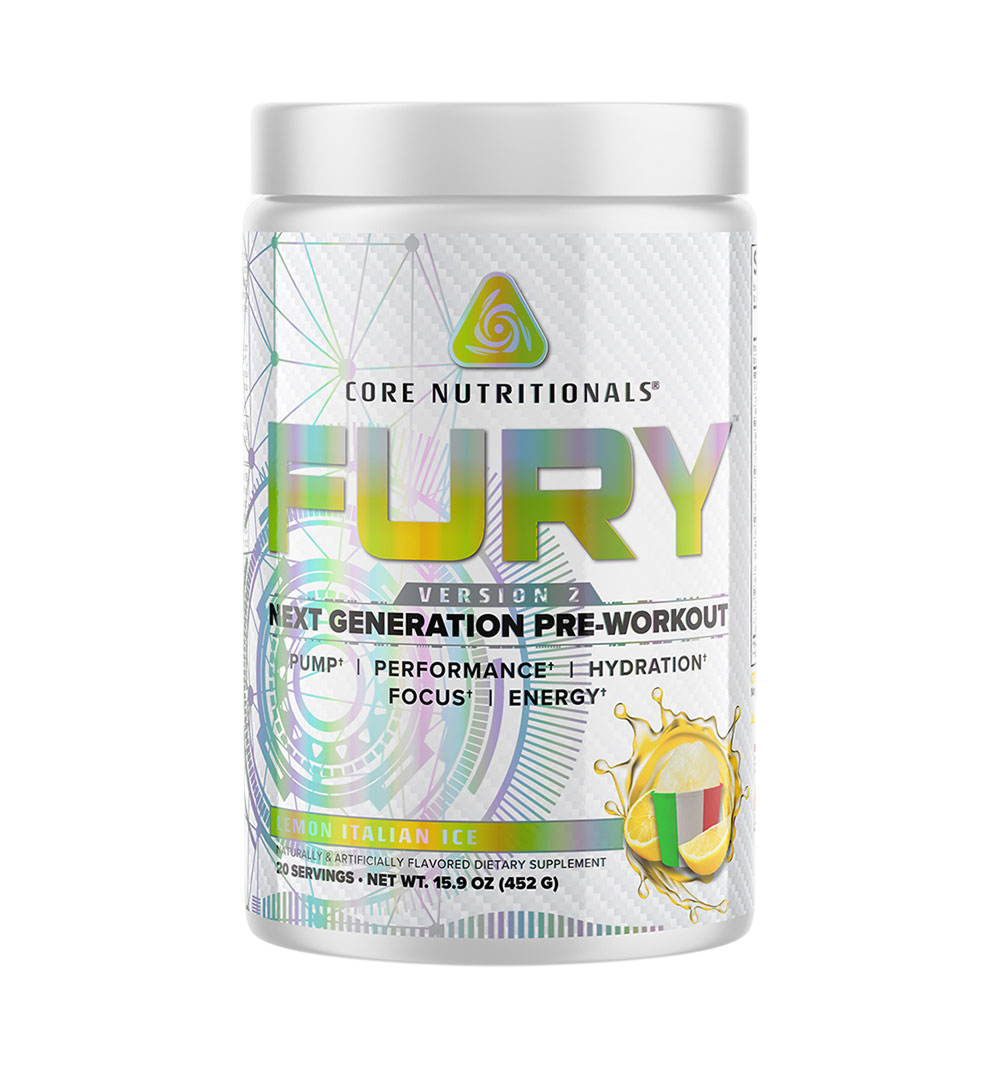
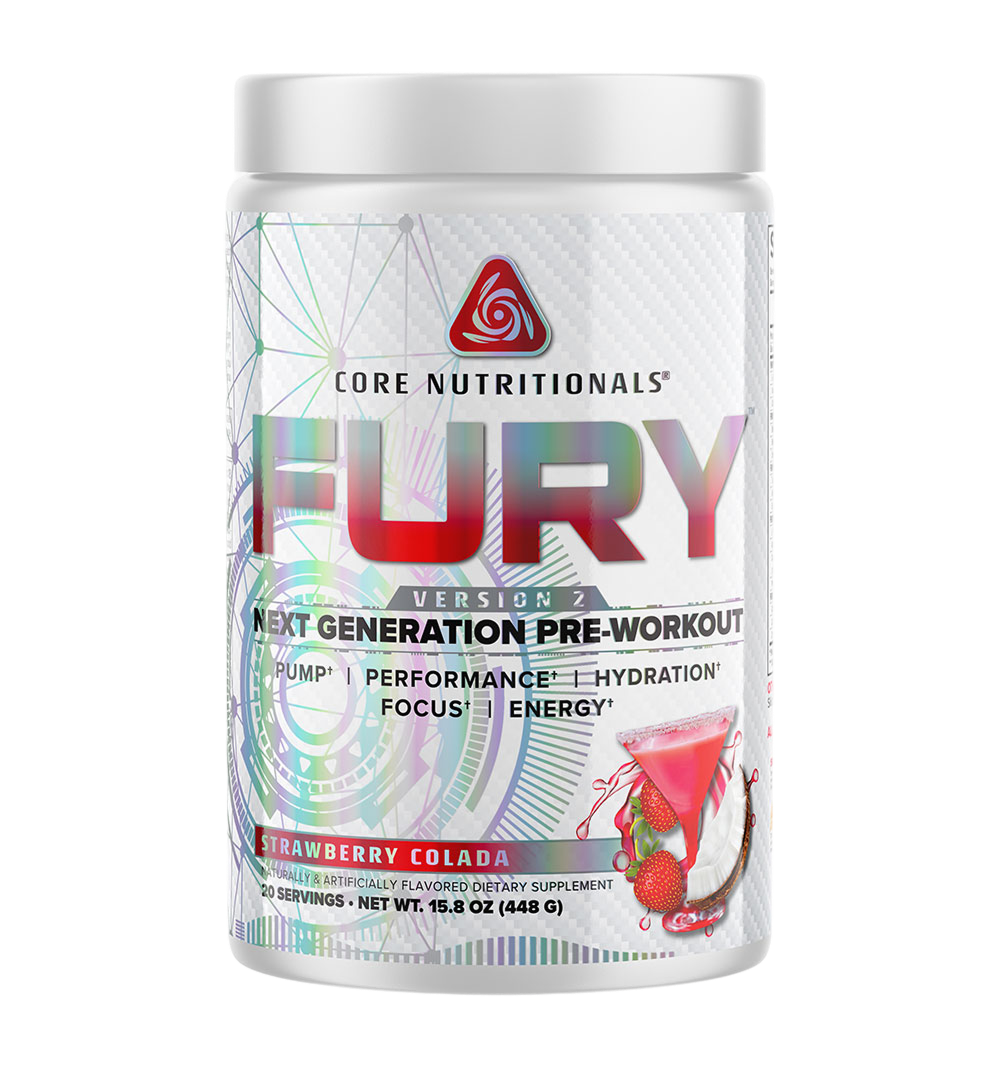
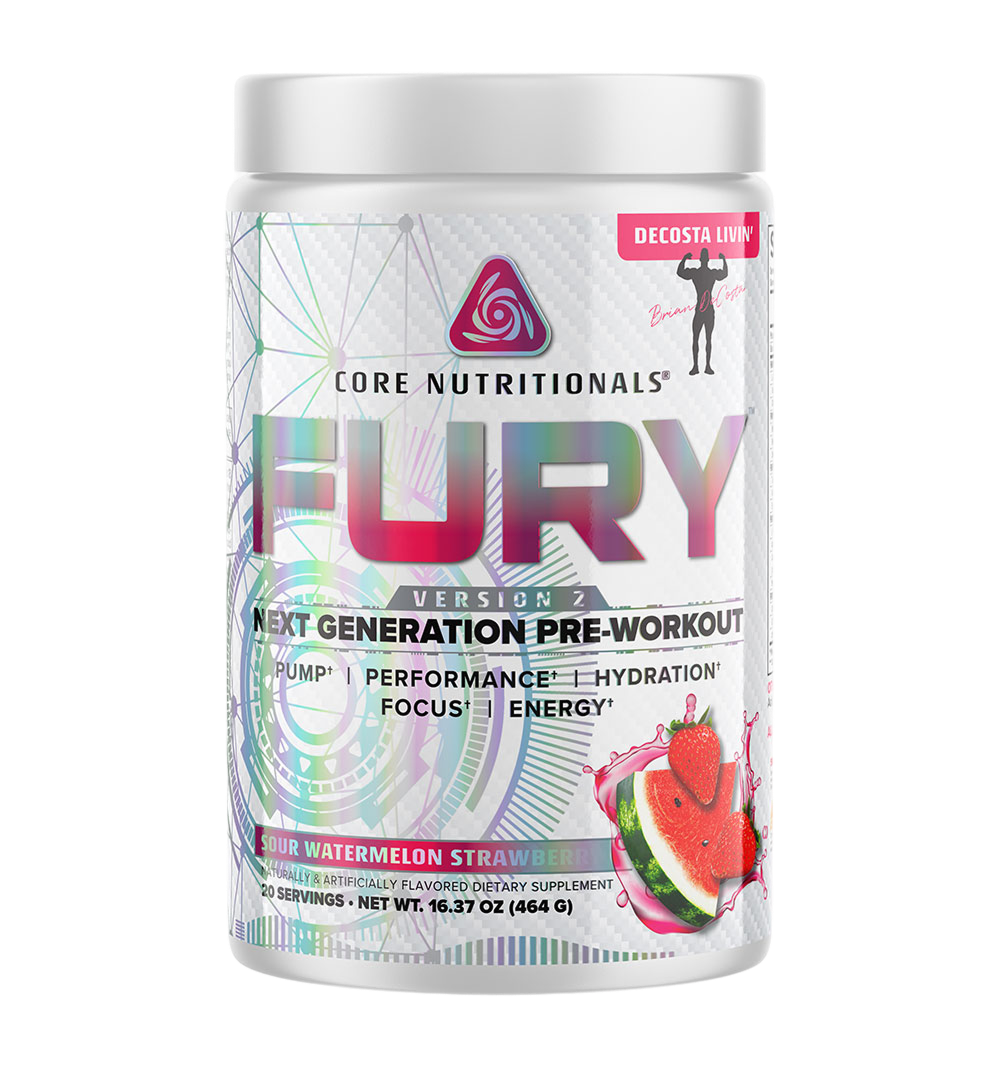
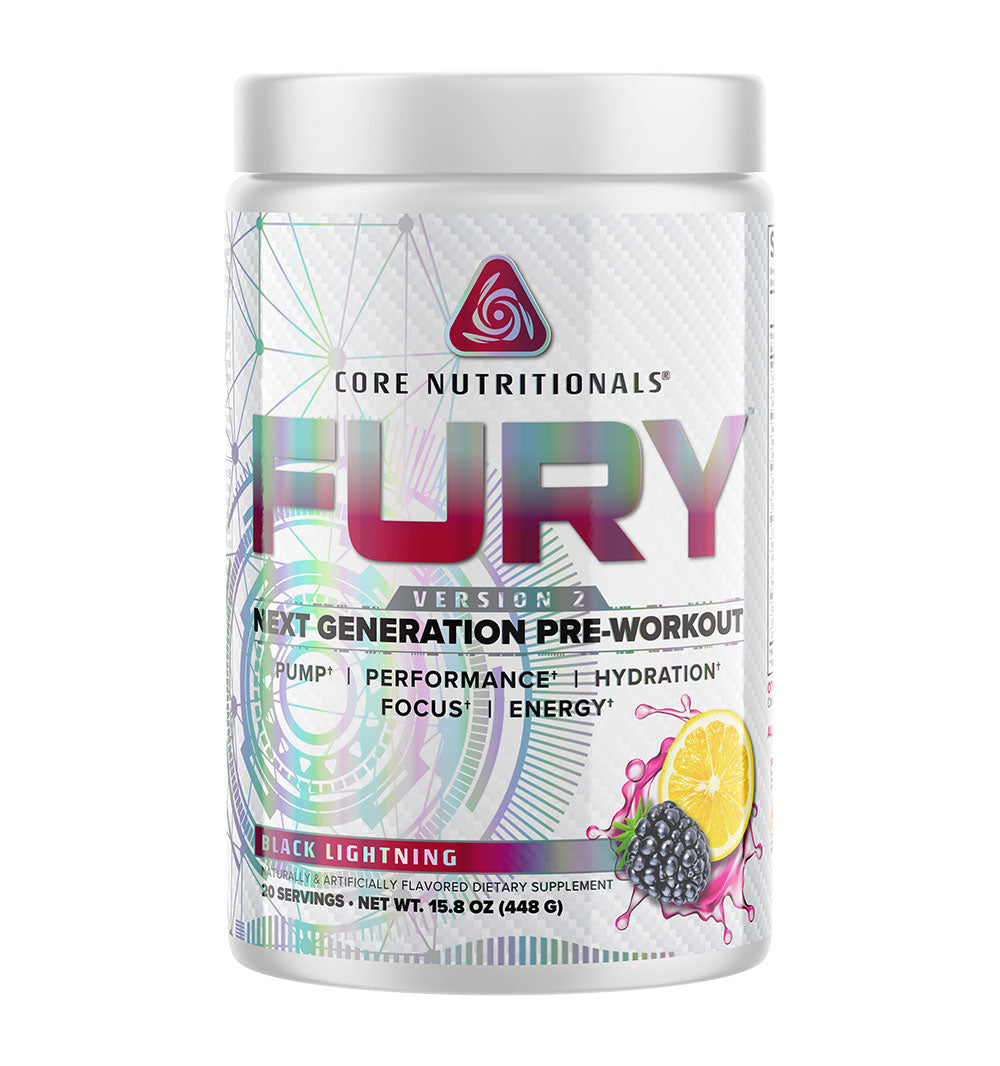
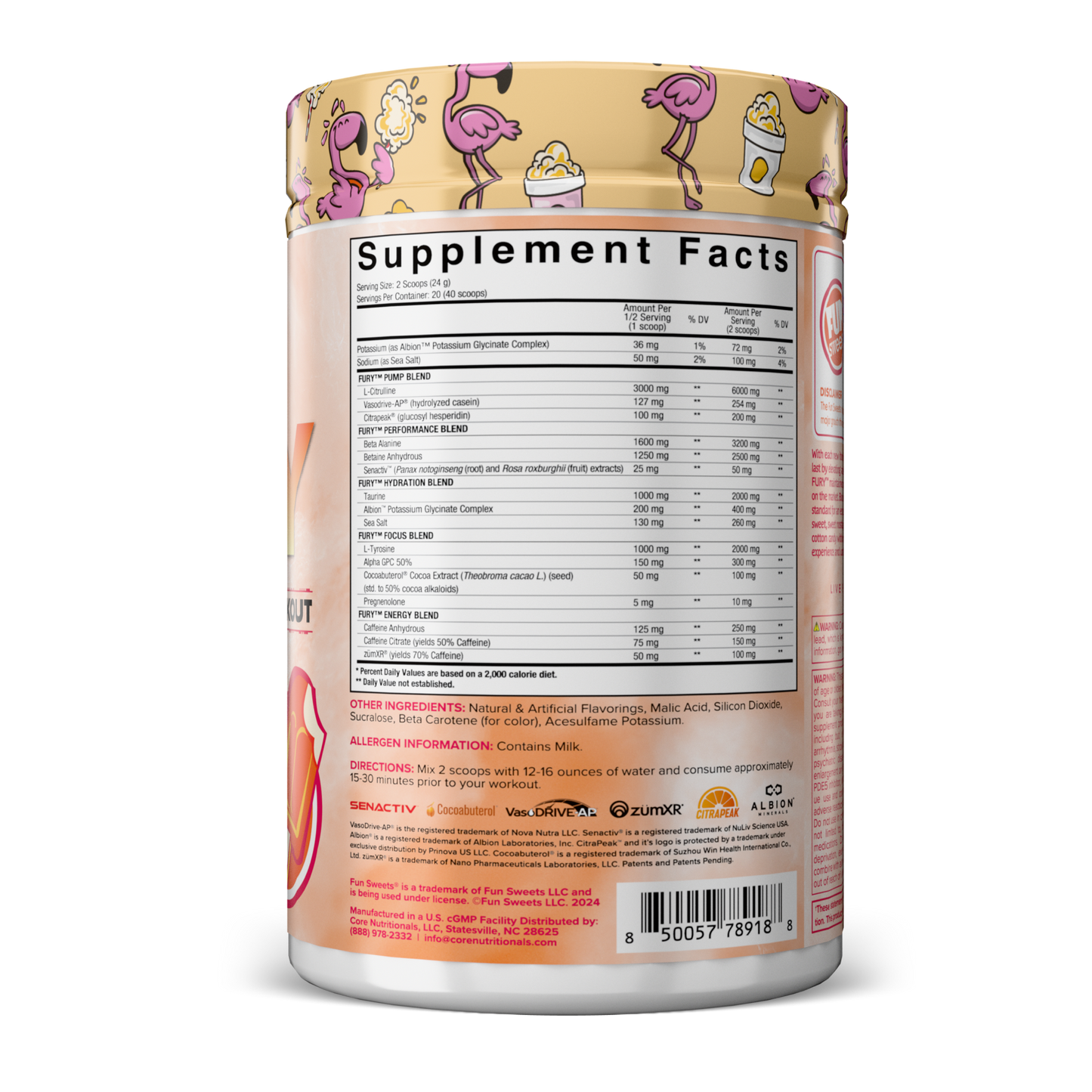
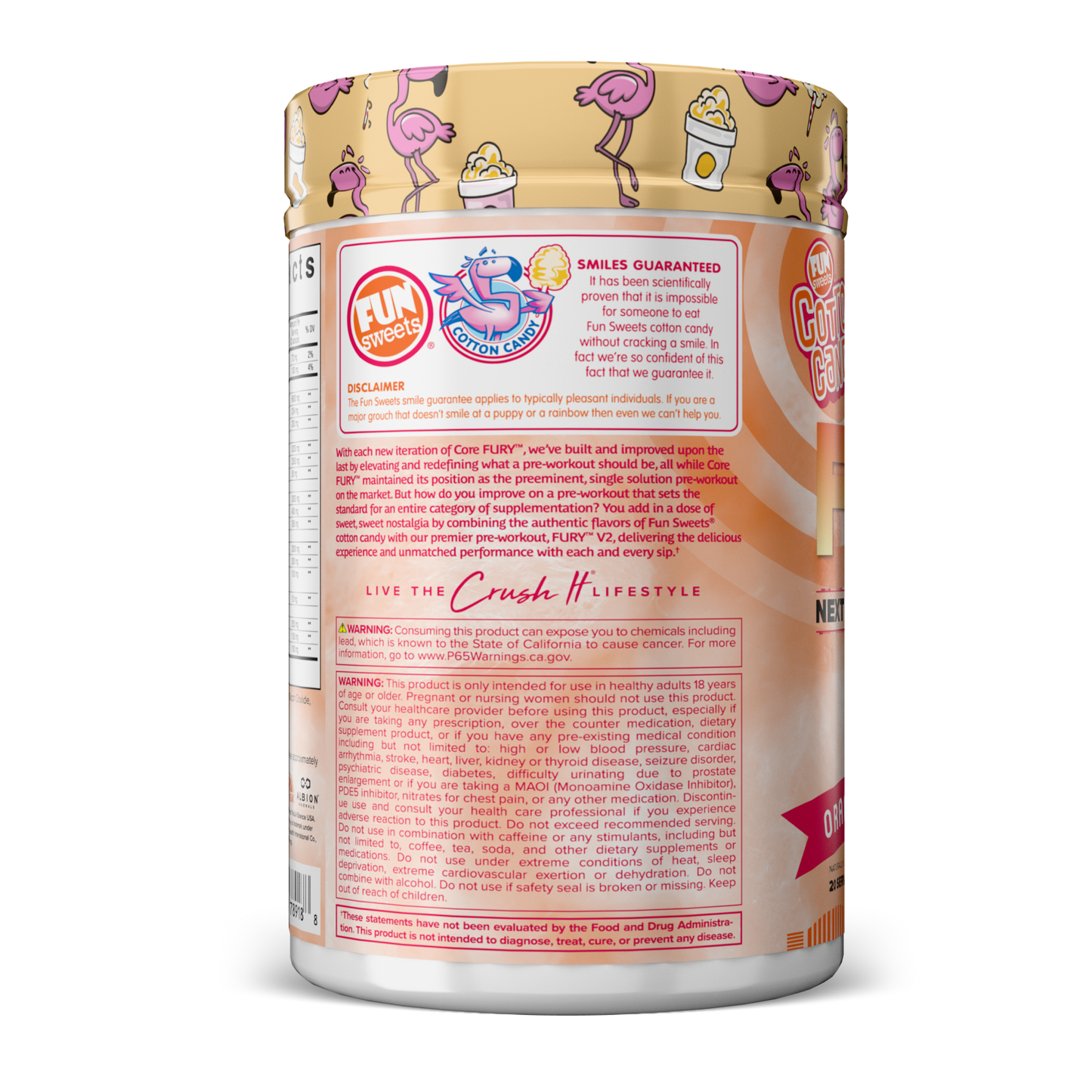
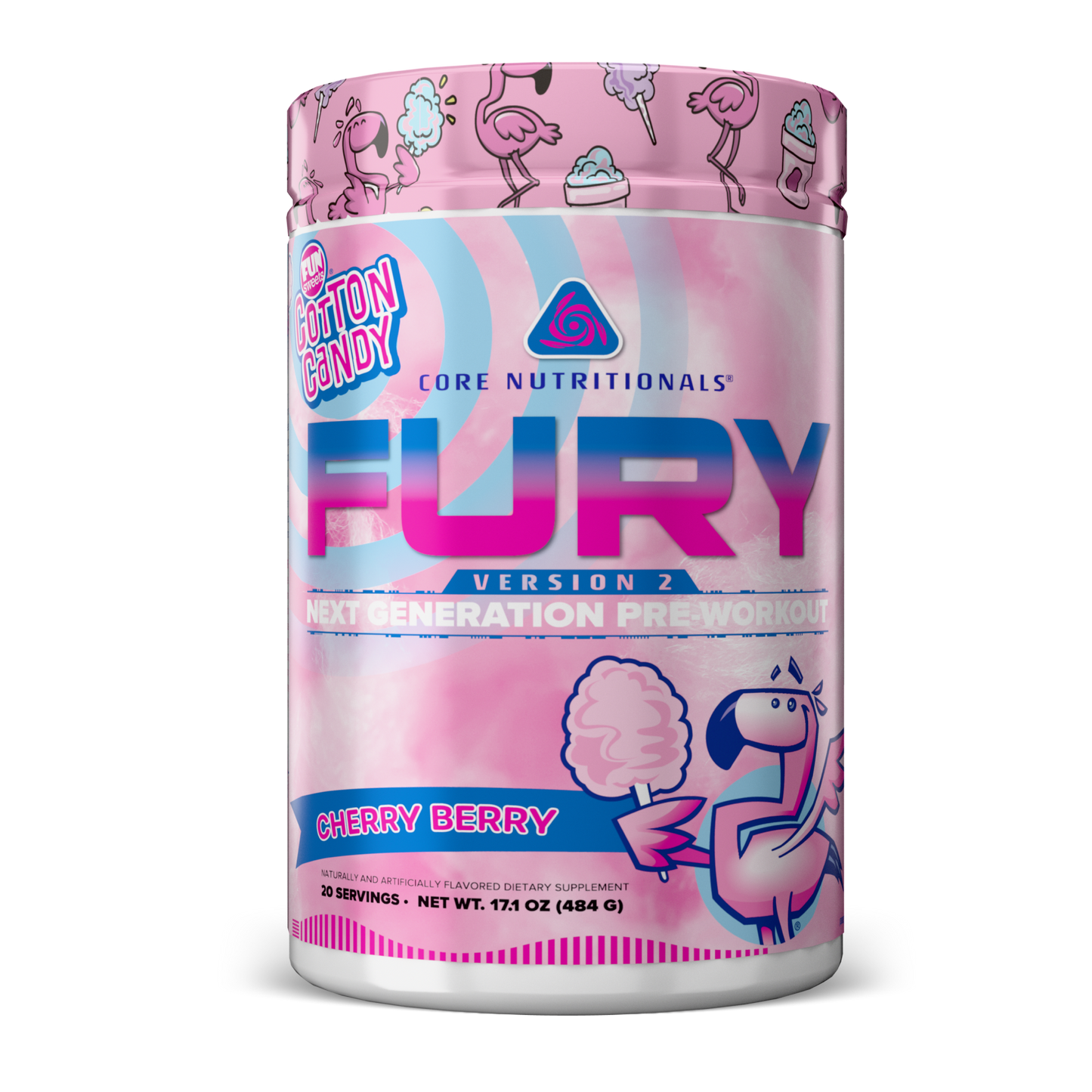
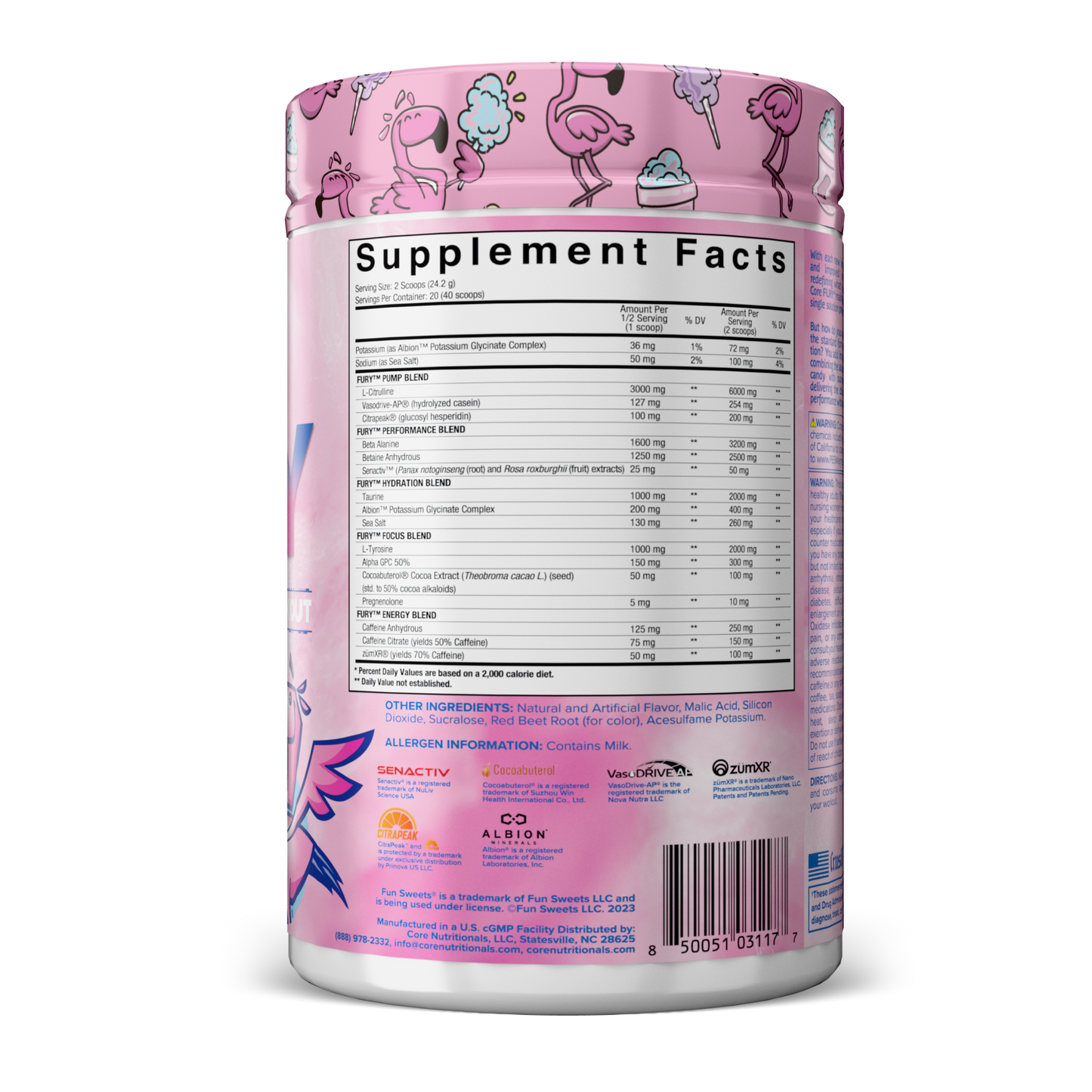
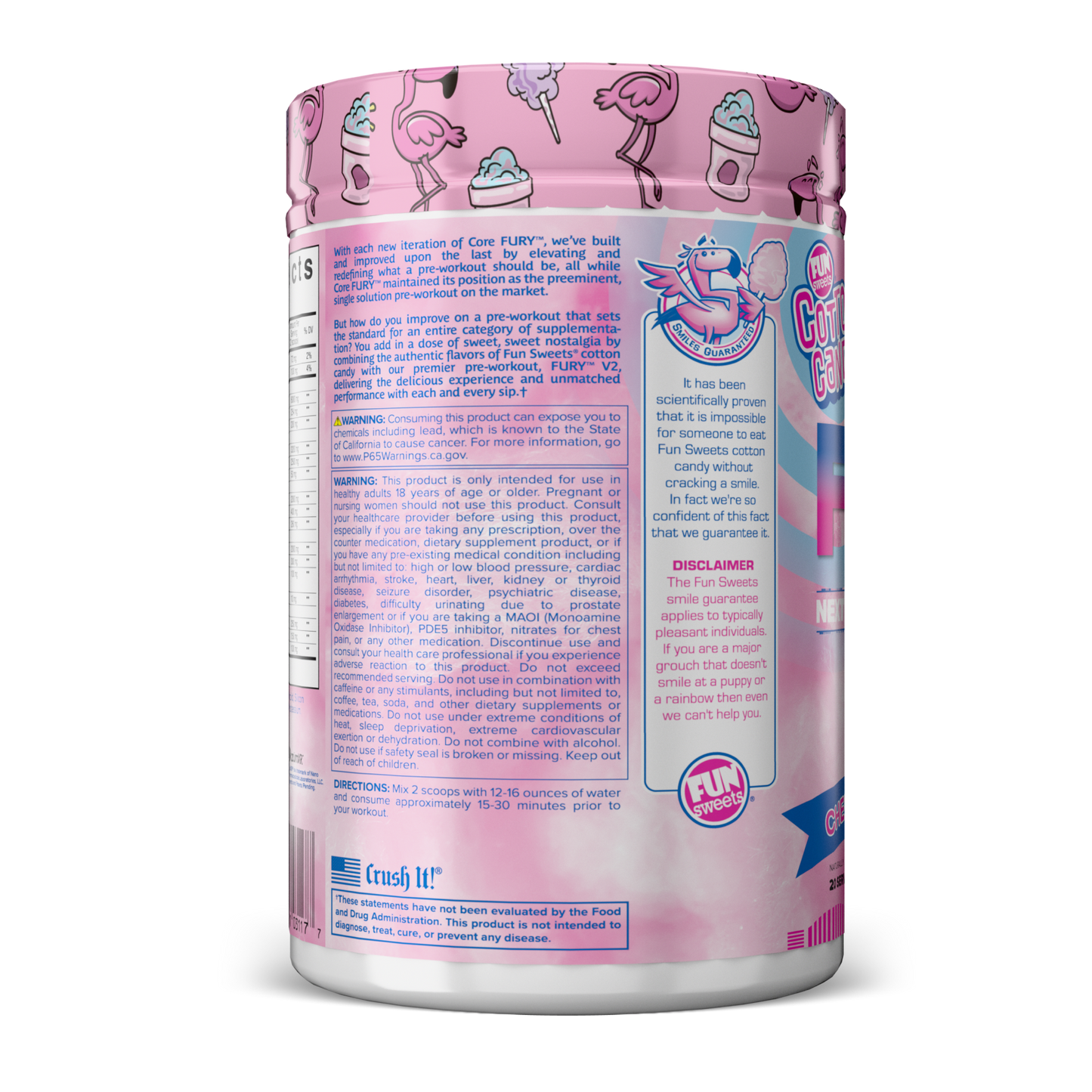
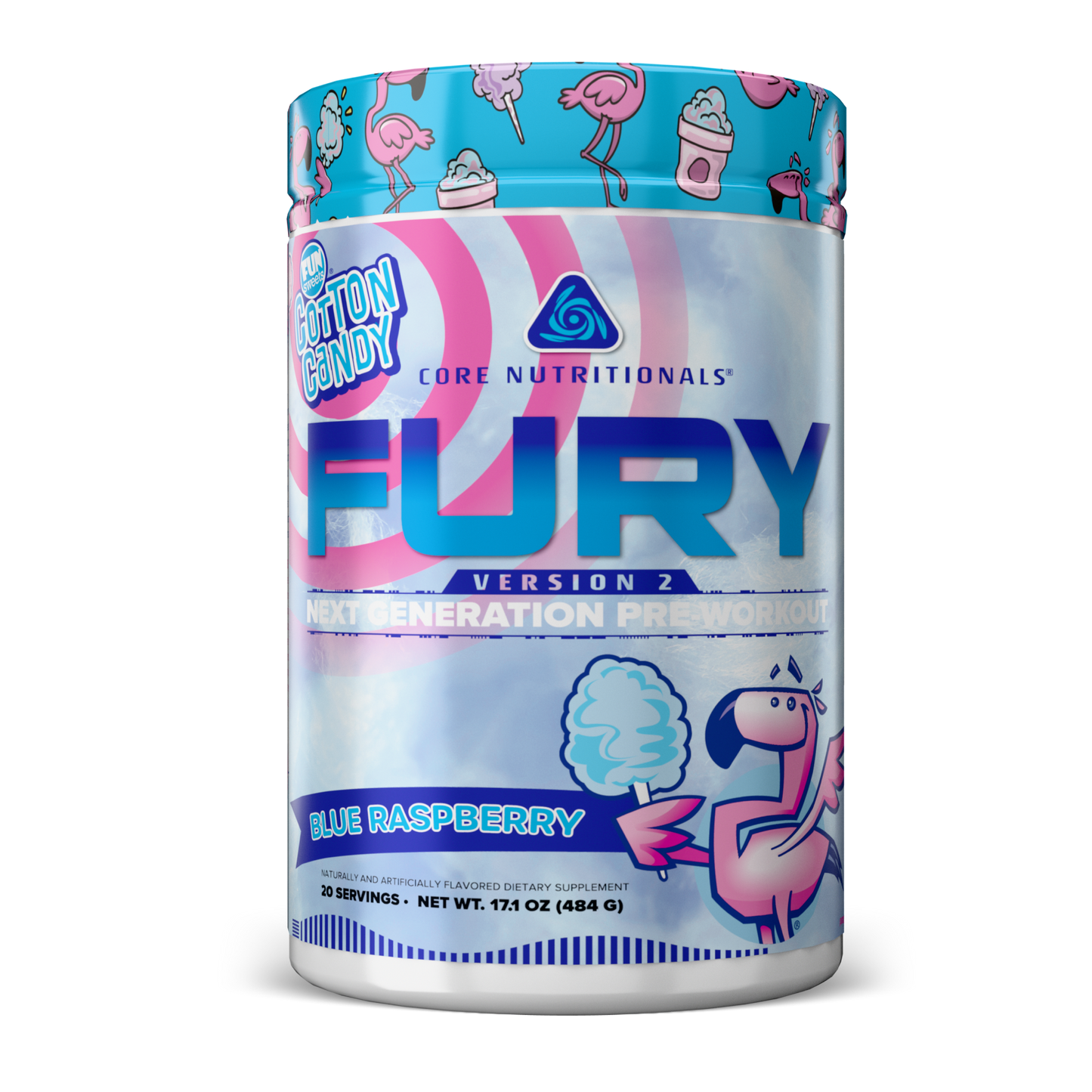
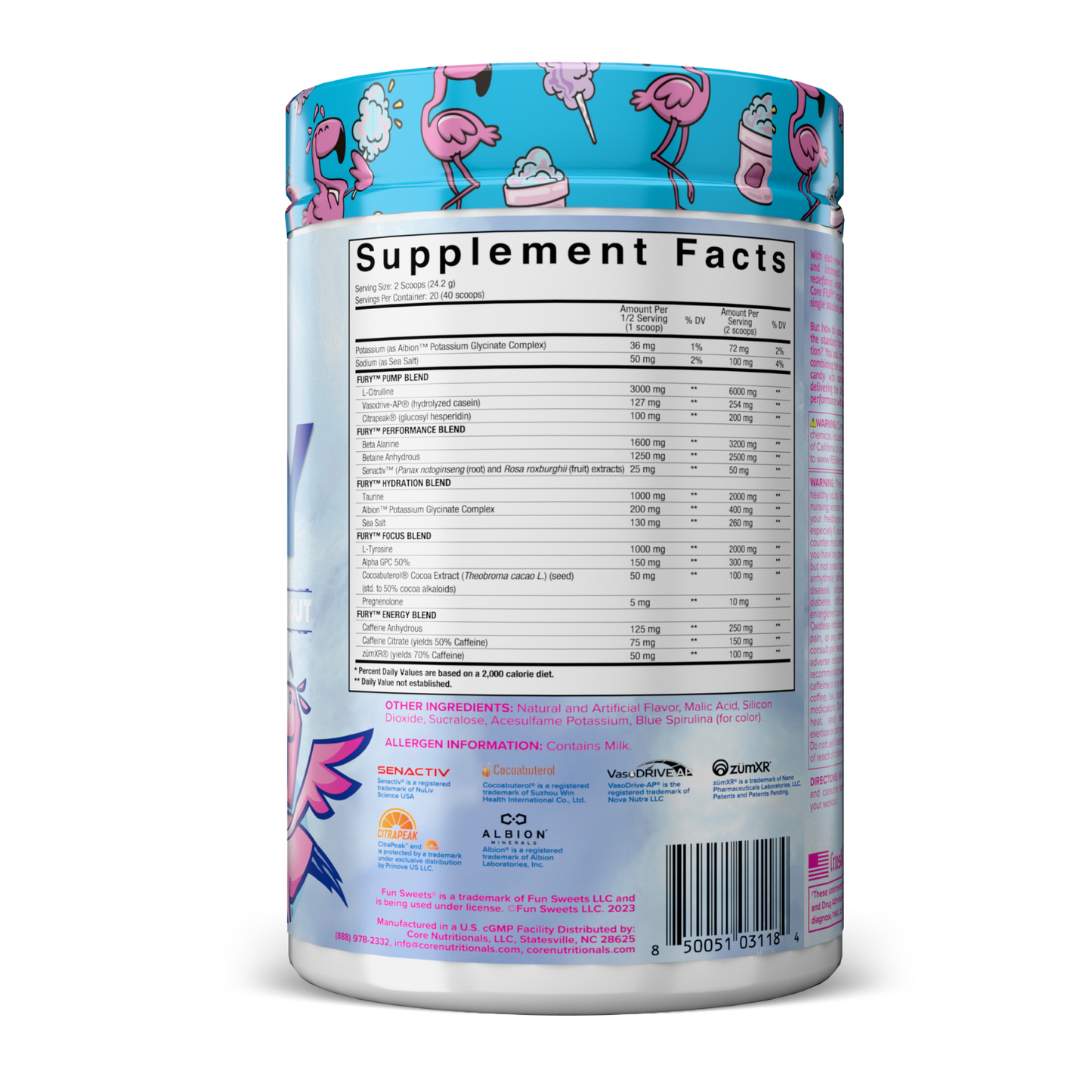
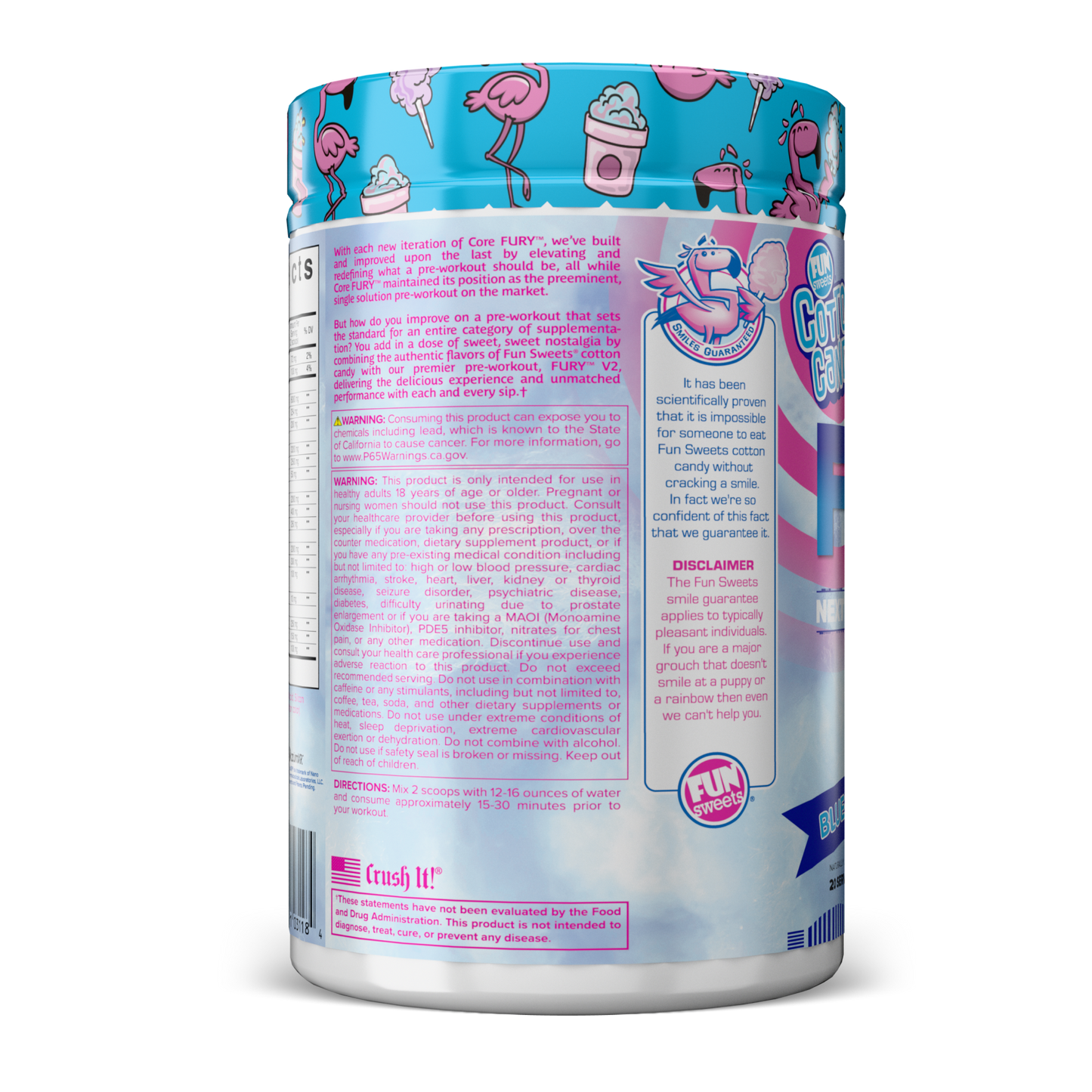
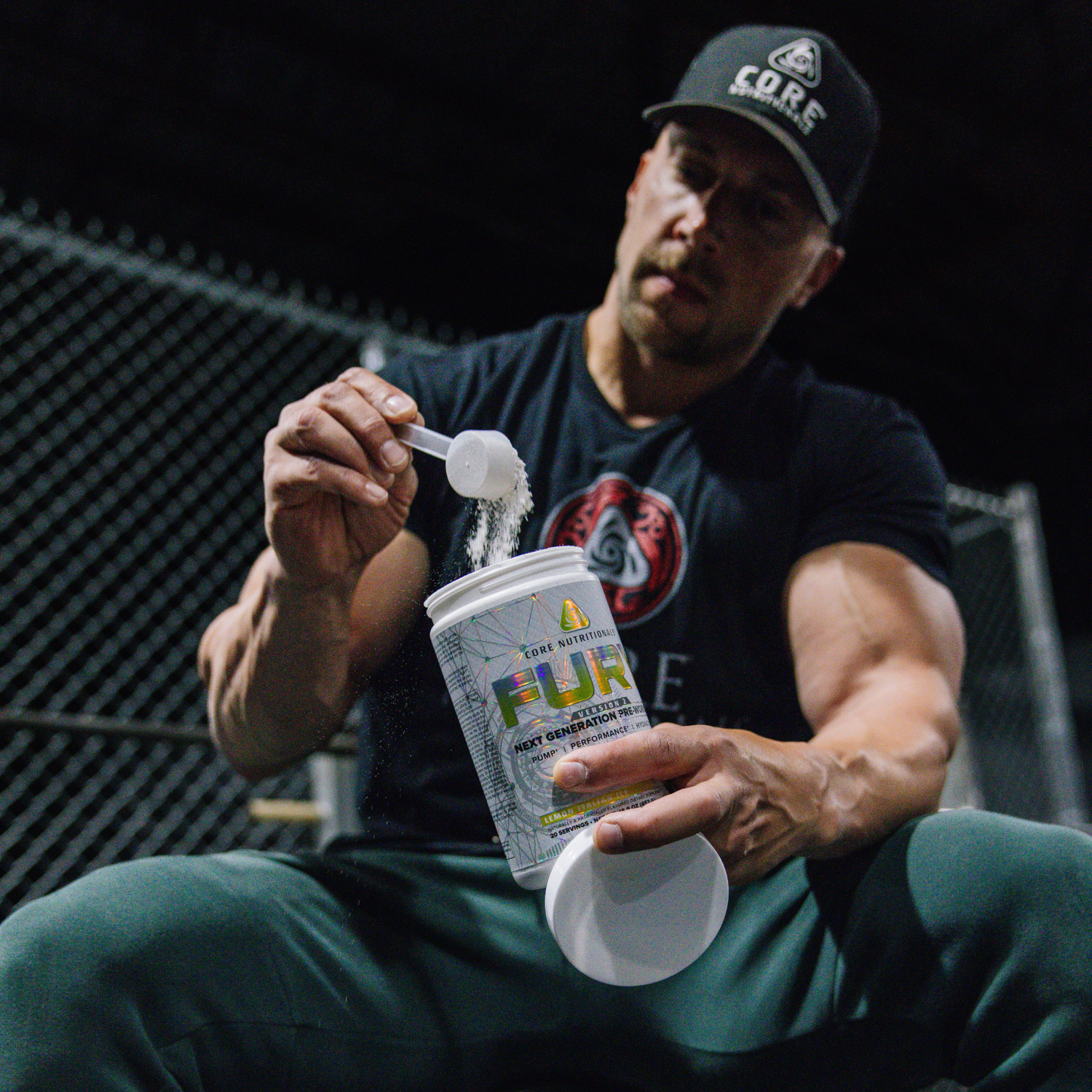
Fury v2 - Pre-Workout
-
Core FURY Version 2 is a meticulously crafted combination of key ingredients created to boost athletic performance, hydration, mental clarity, and energy. For athletic performance, muscle pumps, and athletic performance, ingredients such as L-Citrulline, VasoDrive-AP®, Citrapeak®, and Senactiv™, among others, are included at or above serving sizes suggested by clinical research. These ingredients have repeatedly demonstrated improvements in blood flow, hydration, power output, VO2 max, and time to exhaustion. For cognitive capacity, clarity, and focus; L-Tyrosine, Alpha GPC 50%, Cocoabuterol®, and Pregnenolone are also included at, or above, serving sizes suggested by research. Studies using these ingredients have shown to increase working memory, enhance focus, and reduce cognitive fatigue.
Together, our performance, pump, hydration, focus and energy blends constitute the latest evolution of the pre-workout formula. Unsurprisingly, Core Nutritionals has, yet again, created a new standard in the entire category.
L-Citrulline
Citrulline is a non-essential, non-protein amino acid that forms during the urea cycle and forms ornithine when combined with carbon dioxide. Citrulline is also a critical source of endogenous (natural) arginine, as it is rapidly and efficiently converted to arginine in the vascular endothelium and other tissues.
Citrulline’s benefits have been shown to be greater than its parent compound. While arginine undergoes direct hepatic (liver) metabolism through the enzyme arginase, citrulline bypasses hepatic metabolism entirely and it is delivered straight to the bloodstream. The result is that gut absorption and plasma (blood) bioavailability studies comparing citrulline and arginine have shown two things. First, that citrulline is less readily destroyed and has greater absorption than arginine. Second, that citrulline supplementation increases arginine levels more effectively than arginine supplementation itself.
This translates to promising results. For example, animal studies show a significant increase in anaerobic performance at a 250mg/kg/day serving of citrulline, while studies in humans implicate citrulline in both aerobic and anaerobic performance increases. As a critical part of the urea cycle, citrulline’s performance benefits are thought to be a result of its role in ammonia clearance. Citrulline is implicated in reducing the oxygen cost of muscle processes, along with increasing the rate of post-exercise ATP and phosphocreatine replenishment. As ATP and phosphocreatine are the body’s ‘exercise fuel,’ this may result in citrulline delaying time to exhaustion in aerobic and anaerobic exercise.
VasoDrive-AP®
VasoDrive-AP® is a proprietary ingredient derived from fermented casein. The fermentation process produces two lactotripeptides, Valyl-Prolyl-Proline (VPP) and Isoleucyl-Prolyl-Proline (IPP). Based on the available clinical evidence, these tri-peptides work together to reduce angiotensin converting enzyme (ACE).
In a recent meta-analysis researchers found 30 studies – all of which were randomized and some of which were double-blind – wherein Valyl-Prolyl-Proline (VPP) and Isoleucyl-Prolyl-Proline (IPP), either alone or in combination, exerted a statistically significant effect on improving endothelial function. In one of the analyzed studies, 25 men were challenged with casein hydrolysate standardized for tri-peptides in a randomized and placebo-controlled design. At the conclusion of the study, forearm blood flow, a key measure of endothelial function, was found to be increased by 33%. The researchers in this and other studies demonstrate that the tri-peptides that constitute VasoDrive-AP® exert an inhibitory effect on ACE. ACE, in turn, is a critical component of the renin-angiotensin (RAS) system, which regulates hemodynamics by controlling plasma fluid volume. While the precise mechanism has not been elucidated, researchers believe that the lactotripeptides in VasoDrive-AP® competitively inhibit ACE, thus decreasing the metabolism of bradykinin and systematically dilating the arteries and veins.
Citrapeak® (glucosyl hesperidin)
Citrapeak®, or glucosyl hesperidin, is a unique substance that contains all of the biological functions of standard hesperidin. Hesperidin is a flavonoid commonly found in citrus fruit peels. Some of these functions include increased vasodilation and increased pump factors. Citrapeak® offers these benefits with increased solubility and bioavailability, making it one of the most effective forms of hesperidin there is.
In measures of increased blood flow and bioavailability, Citrapeak® was shown to elicit an 18% increase in blood flow when compared against control as well as a feeling of tangible sensations in as little as 30 min. This means that one can receive a quick and efficient pump benefit thus increasing work capacity.
The proposed mechanism of action for Citrapeak® and hesperidin is that it can acutely stimulate phosphorylation of Src, Akt, AMP kinase, and endothelial NO synthase to produce NO. This increased NO production, while beneficial from a muscle performance standpoint, can also have a positive effect on other factors as well. Clinical studies have shown that hesperidin can increase flow mediated dilation and reduced concentrations of circulating inflammatory biomarkers, such as C-reactive protein, serum amyloid A protein, and soluble E-selectin. So in addition to the exercise performance benefits that hesperidin can provide, it also has been shown to have positive vasculoprotective actions that can benefit the cardiovascular and circulatory system.
Beta Alanine
Carnosine is a bit of an odd duck: we know that it is crucial for muscle function, and that dietary sources of caronsine are essential, but we don’t know precisely how it’s working. Moreover, for decades, we had no idea how to increase intramuscular concentrations, as exogenous carnosine sources degraded in the body so fast as to be effectively useless.
Enter beta-alanine. Simply a different iteration of one of the amino acids that comprises carnosine itself (alanine), beta-alanine has proven to be the most effective means of significantly increasing intramuscular concentrations of carnosine – and therefore of promoting all of carnosine’s various beneficial effects on muscle performance. If that weren’t enough, beta-alanine has also demonstrated beneficial physiological effects independent of its parent compound. In order to understand why, though, we need to first understand some of the basics behind carnosine itself.
Carnosine, a cytoplasmic dipeptide synthesized from the precursors L-histidine and l-alanine, is present in high concentrations in skeletal muscle and plays a pivotal role as a, “chemical buffer” in myocytes (muscle cells). It has long been known that carnosine concentrations are highest in glycolytic, rather than oxidative muscle fibers (roughly speaking, explosive vs., endurance muscle fibers, respectively), and thus long hypothesized that this amino acid is required for sustained performance during supramaximal exercise. Recent research demonstrates that carnosine exerts its physiological effects in long hypoxic (low oxygen) drives by functioning as a high-capacity pH buffer in skeletal muscle, preventing the pH ratio of plasma from dropping too low – and therefore preventing crucial pH-dependent processes such as protein synthesis from being inhibited by acidosis.
Despite its critical role in skeletal muscle anaerobic performance, intramyocellular synthesis of carnosine is rate-limited by the availability of l-alanine. Unfortunately, the majority of literature demonstrates that attempting to increase intramuscular levels of carnosine via either direct carnosine or alanine supplementation is largely ineffective due to carnosine/alanine pharmacokinetics. Enter beta-alanine. Research with beta-alanine demonstrates consistent and dose-dependent increases to intramuscular carnosine concentrations with beta-alanine supplementation, with certain studies showing an increase of 40-60% with chronic administration. These same literature reveal a synergistic effect of exercise on beta-alanine supplementation, whereby the muscle adaptive changes associated with resistance training promote further intramuscular carnosine production in response to beta-alanine supplementation.
In simpler language, this essentially means that beta-alanine is a dietary supplement that promotes its own effects in combination with exercise. As you exercise, you simultaneously intensify beta-alanine’s physiological actions – both directly, as well as in the production of intramuscular carnosine. Once ingested, beta-alanine’s exercise-specific beneficial activity is well-established. Elevation of intramuscular caronsine content via beta-alanine supplementation has been shown to improve performance in the following ways.
- Both acute and chronic increases in total work capacity, measured by total volume during exercise sessions.
- Highly significant increases to TTE (total time to exhaustion), one of the most accurate and comprehensive measures of endurance. In various trials, beta-alanine supplementation has been shown to increase TTE by upwards of 20%.
Increases to total muscle power output in both acute and chronic trials, suggesting that beta-alanine’s most significant benefit is to those engaging in power-dependent resistance training.
In total, a significant body of research exists to suggest that beta-alanine may significantly increase muscle power output, strength, training volume and output, overall performance in hypoxic (oxygen-deprived) conditions and peak VO2 max (oxygen holding capacity).
These myriad benefits make beta-alanine both one of the most-studied, and most well-rounded dietary supplements. Beta-alanine not only has direct, actionable physiological effects, but also promotes critical muscle physiologic adaptations that promote its own effects.
Betaine Anhydrous
Betaine (trimethyl glycine) is found naturally in most living organisms. It is well known to protect non-mammalian animal life in conditions of osmotic stress (a rapid change in the amount of solute surrounding a cell), in addition to functioning as an osmolyte in mammalian (including human) tissues. Betaine is formed in cells as an oxidation product of choline and can be obtained in the diet from foods such as spinach and beets.
Though data on betaine is limited, and recent, the available literature suggests that this compound may have effects in a few areas. Studies on betaine using servings as little as 1.25g/day and up to 5g/day for up to 14 days have shown promising results. In one study, a 2.5g/day serving was found to enhance endurance and total repetition volume for the squat, bench press, and jump squat in in healthy-exercised trained adults. A similar study using the same serving found that betaine use increased peak power and maximum peak power, along with force and the maintenance of both force and power in healthy, exercise-trained subjects.
Perhaps more interesting, however, is a study which examined betaine’s effect on the endocrine system. This study revealed that betaine may exert an effect on several endocrine processes given the proper conditions, causing the authors to hypothesize that long(er) term betaine supplementation may increase the hypertrophic response to resistance training.
Senactiv™ (Panax notoginseng (root) and Rosa roxburghii (fruit) extracts)
Senactiv®, derived from extracts of Panax notoginseng and Rosa roxburghii, has been shown to act in a few pathways to reenergize and rejuvenate cells within the body that take a beating on a daily basis. Ultimately this product falls within a category known as senolytics, or compounds that primarily work to induce cell death. This may not sound ideal as we need our cells to function, but the key is to ensure that these compounds are working on the right kinds of cells. The human body does contain many senescent cells, which are old cells and can be deteriorating. How these senolytics work to promote health is by speeding up the breakdown of these older cells as well as encouraging the grow of new, vibrant cells. The other benefit of Senactiv® and its ingredients is its ability to protect against muscle damage. Ginseng in particular has been shown to help reduce the proinflammatory state that is associated with rigorous training. Where this is going to benefit is to reduce inflammation and jumpstart the recovery process of torn down muscle fibers so these cells can begin to scar and grow stronger. The other benefit that ginseng has been able to show is it has been shown to improve VO2 mas by about 20% when compared to a control group in studies. This improvement can significantly improve oxygen uptake to increase delivery to muscle cells for the ability to push harder and longer.
On another angle of recovery, Senactiv® has been shown to improve the rate of glycogen storage after exercise. When glycogen can be stored efficiently post exercise it has the ability to attenuate the structural damage associated with training by allowing those carbohydrates and sugars going towards recovery.
Senactiv® is a unique blend of ingredients but with sound research and application behind but with its benefits towards improved cell regeneration, VO2 max, and recovery, it is a great addition to this hydration product.
Taurine
Through traditionally referred to as an amino acid due to its chemical structure, taurine is not an amino acid in the sense that leucine, alanine, or glutamine are. Its chemical status aside, taurine is considered one of the body’s most essential chemical compounds, as cardiovascular function, muscle development and function, along with optical and nervous systems in the body depend on its abundance. While data on taurine typically occurs with taurine in supplement combinations (with caffeine and other amino acids), these data nevertheless suggest that dietary supplementation with taurine may have beneficial effects on mental focus and alertness and may assist during times of increased physical exertion.
Albion™ Potassium Glycinate Complex
Potassium, as sodium’s counterpart, acts as a critical electrolyte primarily by helping to maintain normal levels of fluids inside of our cells. Additionally, it helps muscles to contract and relax, aid in strong nerve function, as well as support normal blood pressure. It works very closely with sodium to create the membrane potential needed for the electrical currents that generate these functions to pass from one cell to the next. While the potassium levels in our body are regulated carefully, a diet lacking sufficient amounts of potassium (especially when combined with excess sodium) or one that contains too much potassium can eventually lead to certain types of dysfunctions and poor health status. When potassium levels in the body increase, the adrenal glands release the hormone aldosterone, which causes the kidneys to excrete excess potassium through the urine. When potassium levels are too low, aldosterone levels are suppressed, which can lead to conservation of potassium thus interfering with balance and negatively affecting transport channels that affect vital bodily functions. Potassium can be gotten from the diet in the form of fresh fruits and vegetables, such as sweet potatoes, beans, tomatoes, spinach and broccoli but supplementing can be an essential application as well to support an active lifestyle where excretion is higher than can be replenished through diet.
Sea Salt
Sodium is one of the most essential electrolytes for our body to utilize. As sodium is often found bound to chloride as sodium-chloride (salt), their function and benefits are going to be very similar in nature. Sodium helps to keep the water (mainly amount of fluid outside of the body’s cells) and electrolyte balance of the body, while also aiding in the contraction and relaxation of muscles as well as conducting nerve impulses. While only 500mg of sodium is needed per day for these functions to occur, we as active individuals need far more sodium in order to maintain these functions. We mostly lose sodium through sweat and urine, so the more active we are/the more we sweat and the more we urinate, the more sodium is lost. Acquiring enough sodium through food and drink is crucial to establishing equilibrium again in order to maintain proper functioning and electrolyte balance within the body. The standard American diet is often overloaded with sodium and coupled with inactivity, which can lead to poor health and dysfunction. It is important to engage in physical activity of some kind most days and to eat a diet that is balanced in nutrients in order to maintain proper health.
L-Tyrosine
Tyrosine is amongst a class of amino acids known as ‘non-essential’ amino acids, so called because the body can produce them endogenously, and it is therefore not essential to consume dietary tyrosine. That said, tyrosine is also what is known as a conditionally-essential amino acid; conditionally-essential because, along with glucose and ammonia, the synthesis of tyrosine additionally requires adequate levels of phenylalanine. Once synthesized, tyrosine is one of the most critical amino acids, given its prominent role as a substrate in the synthesis of the catecholamines dopamine, norepinephrine, and epinephrine, in addition to both T3 (triiodothyronine) and T4 (thyroxine) thyroid hormones.
In studies on stress modulation, tyrosine has been demonstrated to reverse stress-induced norepinephrine depletion and the depressant-behavioral effects normally associated with it. In simpler terms, tyrosine may, in certain conditions, dampen the extent to which norepinephrine is removed from the bloodstream during a stress event. In simpler terms still, tyrosine may help to mitigate the sense of depletion and fatigue felt at the end of a workout.
Tyrosine may also play important metabolic functions, mostly related to its role in synthesizing compounds which stimulate the nervous system. While not traditionally considered a sympathomimetic amine, studies which have coadministered tyrosine and stimulants demonstrate a synergistic effect. These studies suggest that tyrosine may potentiate the effects of both endogenous and supplemental norepinephrine and its mimetics (in the case of exogenous use) with respect to lipolysis, thermogenesis, and energy expenditure. Meaning that tyrosine may play a role in assisting norepinephrine to break up triglycerides and increase body heat transiently.
Alpha GPC 50%
Of the known choline pro-drugs or precursors, Alpha GPC appears to have exert the greatest influence on circulating choline levels. Choline is an essential nutrient involved in numerous metabolic pathways, including DNA regulation and repair, protein function, and metabolism. Perhaps most importantly, the critical neurotransmitter acetylcholine is produced directly from free choline via cholinergic neurons. Acetylcholine is then responsible for several functions itself, most crucially as the compound which induces muscular contraction, and as the neuromodulator partially responsible for modulating risk/reward, arousal, and enhancing memory.
Choline’s essential role as a substrate for acetylcholine, and therefore brain development, is well documented in animal models. These studies demonstrate that levels of free maternal choline have a direct and fundamental impact on prenatal brain development, with the enhancements or deficits lasting into adulthood. Choline’s enhancing effect is particularly prominent in the hippocampus. In humans, the hippocampus is primarily involved in the consolidation of memory (taking short, episodic memory and translating it into long-term memory) and the learning of new information. Acetylcholine is a critical component in these processes, as mentioned above, and choline may therefore play a potential role in these processes as well by providing the substrate for acetylcholine synthesis.
Whether through these, or other independent mechanisms, a recent trial using Alpha GPC demonstrated a statistically significant increase to power output. In a placebo-controlled, double-blind, randomized trial, 14 healthy volunteers, split into an Alpha GPC or placebo group, were tested on various exercises. In comparison to the placebo group, the Alpha GPC group experienced a 14% increase to bench press. The researchers hypothesize that the peak power increase was the result of a substantial acute increase to growth hormone, one of the observed effects of Alpha GPC supplementation.
Cocoabuterol® Cocoa Extract
Cocoabuterol®, made up of the bioactive compounds found in cocoa, has been shown through studies and application to have beneficial factors on fat loss, muscle building, and insulin sensitivity. This ingredient exhibits a mechanism of action in the body to increase cAMP (cyclic adenosine monophosphate) levels, which acts as a second messenger and regulator of many movements exhibited by all three types of cells in the human body. In this context, fat (adipose) tissue epinephrine utilizes cAMP to increase to triglyceride hydrolysis and cardiac (heart) muscle epinephrine utilizes it to increase contraction rate. This action can have positive benefits on body composition and performance.
Theobromine, one of the main methylxanthine compounds found in cocoa is primarily effective in the increase of nitric oxide to in the blood stream, which is beneficial to produce the “pump” when ingested pre-workout. Another reaction that can be seen with theobromine is dilation of blood vessels. This can increase blood flow during vigorous exercise leading to increased time to exhaustion but also can pose benefits to individuals who suffer from high blood pressure. Theobromine also has a very high bioavailability and ability to stay in the body for extended periods of time (7-8 hours). Several studies have also looked at the effects of theobromine on human subjects and results have shown its ability to reduce oxidative stress on cells and regulation of gene expression.
Cocoabuterol® has also been shown to have positive benefits on reducing oxidative stress in the body. Due to its rich antioxidant properties, it has the ability to fight off free radicals that can be detrimental. In addition to this, the polyphenols that Cocoabuterol® contains have been shown to reduce inflammatory signals within the body that can also be detrimental biomarkers.
By now you have read some of the amazing benefits of Cocoabuterol® and why we have included in this recomposition agent. When your goal is maintaining muscle mass, shedding body fat, reducing overall stress, and performing at your peak, we make sure you are equipped with the right ingredients, in the right dosages, and for the right purpose. In summary, Cocoabuterol® does all of these things by:
- Increasing power output due to elevated NO production via theobromine effects.
- Increasing adipose usage through cAMP action in the body.
- Improving senses of well-being due to high levels of polyphenols and antioxidants reducing overall stress on the body from workouts and life events.
Pregnenolone
Pregnenolone, or pregn-5-en-3β-ol-20-one, is known as the grandmother hormone due to its precursor role in the endogenous biosynthesis of most steroid hormones. Pregnenolone also has potent intrinsic activity, however, functioning as a neurosteroid. In that capacity, pregnenolone has been investigated as a mechanistically novel agent for treating cognitive and behavioral symptoms associated with schizophrenia and other mood disorders.
Pregnenolone has been demonstrated to enhance learning and memory in animal models at physiologically relevant concentrations. For example, acute administration of pregnenolone or pregnenolone sulfate to rodents results in increased performance along several standardized tests – including maze tests given to rodents to test working memory. Additionally, pregnenolone appears to prevent learning and memory deficits induced by NDMA receptor agonists. These results suggest that pregnenolone’s cognitive functions are at least partially explained by modulating the NMDA receptors – critical receptors involved in numerous neurological processes.
Caffeine Anhydrous
Caffeine is one of the most widely consumed, and perhaps one of the most reviewed, psychoactive compounds. Its physiological effects in a range of areas have been well-documented, including exercise performance, information processing, alertness and mood enhancement, attention, and awareness, along with its anti-lipogenic and lipolytic abilities.
Most importantly to Core FURY, caffeine has been shown to have significant effects on exercise performance, even with ingestion in servings as small 3 to 9mg/kg/bw/day (the equivalent of 2 cups of standard coffee, for a 170lb male). In endurance training, possible explanations for caffeine’s performance-enhancing effects lie in its metabolic effects on both lean and fat tissue. It is suggested that caffeine’s potent lipolytic (the breakdown of fat tissue into fatty acids) and oxidative (the actual ‘burning’ of fat) action allow the body to utilize these sources during prolonged submaximal exercise. As a consequence, muscle glycogen is spared and available for use later in the training session. Practically speaking, this means caffeine is forcing your body to preferentially use fat tissue as a fuel source, while sparing the glycogen which gives you the full-bodied look!
In short-term exercise, caffeine’s demonstrated role in the inhibition of cyclic AMP- phosphodiesterases (PDE), adenosine receptor antagonism, and adrenoreceptor agonism come into play. These three pathways collectively stimulate lipolytic activity, boost fat metabolism, increase metabolic rate and energy expenditure, and regulate the body’s thermogenic activity. The practical results of activating these pathways are increases to the contractile force of both cardiac and skeletal muscle (harder flexion), an increase in energy expenditure (freeing up more caloric energy to be used in contraction), dilation of vasculature (better blood flow), and improvements to both nitrogen retention and skeletal muscle protein synthesis (key components to muscle building
In Core FURY, we have included a per-serving amount of caffeine that is neither excessive, nor arbitrary, but that instead reflects the servings used in clinical research.
Caffeine Citrate
Caffeine citrate is not generally seen in the typical sports performance area. It is more commonly prescribed for premature infants for a short time for the treatment of apnea of prematurity. Apnea of prematurity occurs when a premature infant doesn’t breathe for 15-20 seconds during sleep. In addition to this caffeine citrate can at times be prescribed for migraines in some individuals.
Recently caffeine citrate has gained some popularity in sports performance as it appears to be able to raise blood caffeine levels faster than other caffeine sources. This allows for a quicker feeling of increased energy. For example, typical caffeine levels peak at about 60-120 minutes post ingestion of caffeine anhydrous, whereas blood levels peak around 30 minutes post-ingestion for caffeine citrate. The one drawback to caffeine citrate is that it provides 50% less caffeine per dose than caffeine anhydrous. The specific blend of caffeine sources we have used in Core FURY V2 compliment each other through differing release times, meaning you will have a quick and effective stimulant feeling with caffeine citrate, a fully dosed serving of caffeine anhydrous, as well as a specific delayed release caffeine in Zum-XR® (outlined below) to give you the quick hitting and long-lasting energy you need to get through your workouts.
Zum-XR® Caffeine
Züm-XR is a patented coating technology that allows the dissolution profile of certain ingredients, primarily caffeine, to have a longer lasting effect in blood serum levels. The release of those ingredients is initiated by an abrasion in the stomach and pH levels between the stomach and the upper gastrointestinal tract. The coating of the microbead technology is a patented timing system with pharmaceutical grade safe polymers. Comparatively speaking, the dissolution profile of Züm-XR caffeine to your typical immediate release caffeine showed that Züm-XR took a far greater amount of time, well over 120 minutes to complete the process of dissolution.
-


